#I have no problem with plots that bring so many new and profound experiences to the characters that it changes them in one or more ways
Text
People complaining about OOCness when it comes to Guardian Novel-based fics, without considering whether the plot itself is consistent to support the changes in the characters (so it wouldn't be OOC at all), but proceed to read and praise drama-based fics
As if Zhao Yunlan isn't a very different person in the drama and Shen Wei isn't even recognizable as the same character… Seriously.
Just today I tried to read three drama-based fics, they're not recent works but were recommended, some were fics with three digits of kudos. I thought: maybe? I've read so many wonderful drama-based fics before.
I must be out of luck today, because I was there reading and three times in a row, Zhao Yunlan and Shen Wei were on the scene and I was wondering: who are these people?
Then I noticed what the three fics had in common, the problem I mentioned in a post some time ago. With all my heart I hate you Fanon.
#and among my friends I am the person most attached to the drama#I have no problem with plots that bring so many new and profound experiences to the characters that it changes them in one or more ways#I don't even consider this as OOC#OOC is when for no reason the character is already vastly different from how they are in the source material#But I'll always have a problem with Fanon things#In any fandom this always ruins the experience and unfortunately there is no filter to curate my experience in this case#fanfic#fanon#ooc#fandom problems
5 notes
·
View notes
Text
Repost Vol. 58: In The Year 2000….Liugeaux’s Top 10 of the Decade
I found this today and thought it would make a good remixed repost. 14 years ago I was writing a lot of video game stuff for Techpedition.com. I’m sure no one ever read it, but it was fun putting my opinion out there, much like its fun doing it here. The only difference is, here, I KNOW no one is reading it. So there’s a bit more of a laissez-faire attitude to how weird I get. Hence, these re-visited “articles”. As I’ve done in the past, I’m posting the original article from Techpedition, warts and all, and I’ll be inserting commentary with my current opinion throughout. As always, this should be fun.
Originally shared via Techpedition.com on December 24, 2009. Commentary will be in Bold.
In The Year 2000….Liugeaux’s Top 10 of the Decade
Right from the start, the presumption that my internet name is important enough to include in the article title is hilarious. Also, the “In the year 2000...″ was a reference to a 10 year old Conan O’Brien bit. I don’t know if it played well in 2009, but it definitely doesn’t play well in 2023.
We are 10 years into the new millennium and I don’t have hoover boards, flying cars, or food in pill form, but what we do have are some kick ass games to play. I’ve compiled a list of my top 10 games of 2000-2009. Now before throwing the inevitable “How can you exclude game x?”, remember that I am only one man and can only play so many games. Actually I can tell you exactly how many games I’ve played, lol. The games I’m listing here are games that have either had a profound impact on my gaming habits, consumed ridiculous amounts of my life or left an imprint so strong they cannot go unmentioned. Let’s see what I’ve chosen. I still had a real problem with using a double space after periods. Clearly a hold-over from college research papers.

10. Burnout Paradise
Burnout has always been the critics favorite arcade-style racing game, but it never sold as well as it’s (that’s the wrong its) EA stablemate Need For Speed (probably because of the licensed cars). Paradise brings much needed open world gameplay to the series and its (that’s the right its) year’s worth of DLC updates makes it a compelling purchase to this day. It’s seemingly never-ending list of online content is what made it the the only racing game to get my attention in almost a decade. I guess I’m not counting Mario Kart.

9. Bioshock
I have gushed about Bioshock before (That’s a link to a Bioshock review I did 2 years after the game came out, as part of my short-lived review series GST-Gamer Savings Time, where I reviewed games that were newly cheap. It was a bad idea.), and with good reason. Bioshock’s gameplay may not be perfect, but what it lacks is more than made up for in the story, atmosphere, and characters. Such an uncomfortably written sentence. To this day, Bioshock’s plot twist is something that I refuse to spoil for anyone and it holds the distinction of being one of the games I simply could not put down.
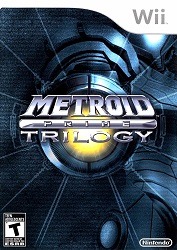
8. Metroid Prime Trilogy
I know that putting the “trilogy” on this list is a kinda cheating, but I felt that I had to put one of the Prime games on the list, so why not make it the best package. My purchase of Metroid Prime was done as “why not” purchase. The game was $4.99 and I had run out of games to play. I wasn’t playing FPSs and I wasn’t too familiar with Metroid. By the time I was done, I found myself wanting to play more FPSs and being disappointed with many that I would pick up and play later. As good as the original Gamecube titles were, I highly recommend you pick up the full proper experience and grab the Trilogy. The point and shoot controls are near perfect and you get all three fantastic games. Not mentioned here is how Metroid went on to be one of my favorite gaming franchises, with Super Metroid being one of my favorite games ever.

7. Uncharted 2: Among Thieves
Uncharted 2 is the newest game on my list, but its no less deserving than any other. By blending cinema quality cut scenes with an extremely solid single player campaign, Uncharted creates an experience that is more like an interactive movie than a video game. Its big in scale, with action set pieces that Indiana Jones, John McClane and Jason Bourne would kill for. So far its one of the only games that has proven that the PS3 has significantly more horsepower than its competitors. I really had no grasp on the English language, or I just refused to properly proofread. That paragraph, while accurate, is so full of grammatical errors, even I can’t take myself seriously.

6. Super Mario Galaxy
As almost a joke, the idea of Super Mario Galaxy, seemed ludicrous. It was almost like Miyamoto said, “we’re out of ideas, let’s send his ass to space.” What came of this decision is the most engaging Mario adventure since Super Mario 64. Adding almost a 4th dimension to the adventure, Galaxy’s puzzles and gameplay mechanics are truly revolutionary and left me blown away. Two too many “almost”s and one too many “adventure”s, but again, what I’m saying isn’t wrong.
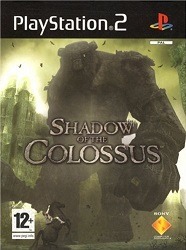
5. Shadow of the Colossus
Team Ico’s second outing on the PS2, was one of the most interesting games ever released and truly a marvel for its time period. Released towards the end of the PS2’s hey day Shadow, threw all gaming conventions out the window and gave players exactly what they wanted, Boss Fights. As simply a series of elaborately well orchestrated puzzle-like boss fights your character, Wander, must find the weakness of each colossus in the game and exploit it to defeat it. This combined with a brilliant art style and a hauntingly vague story makes Shadow an absolute must-play on the PS2. Was I drunk when I wrote this? I sound like a 15 year old.

4. The Orange Box
Again, I’m kind of cheating by putting The Orange Box in this list, but its inclusion is more of a symbol for the roll (it’s role, you dumbass) that Value (it’s Valve, yeah I definitely didn’t proof this at all) has had in gaming since the turn of the century. With the release nearly half a dozen critically acclaimed and eqaully fantatic (equally fantastic, sigh) games (many of which are included in The Orange Box) Valve has cemented themselves as one of the few publishers that can find success on the PC, and with the advent of Steam, Valve has revolutionize digital distribution and helped numerous smaller developers become overnight hits. Oh, and on top of that, The Orange Box is hands down the Best Deal in Gaming History.

3. Super Smash Bros. Melee
Two Smash Bros games were released in the past ten years, but only one kept my attention for a solid five of those, and that would be Melee. Melee is easily one of the most balanced fighting games to ever be released and its equally as exciting as it is pure fan service. Even if you are not that good at it, buying SSBM is still a good idea for all Nintendo-philes.

2. Lumines 2
Not since Dr. Mario, and Tetris has a pure puzzle game been so effective at destroying my time. Lumines 2 improved on much of the problems that Lumines had and took the puzzle genre on a much needed acid trip. Its deceptively simple gameplay, mixed with music and atmosphere creates an experience that even after sinking 60+ hours into it I regret not having played more. To this day Lumines 2 is the only PSP game I take on every single road trip. In retrospect, putting Lumines so high is a bold choice. Personally, it DID have a profound effect on my gaming habits, but at #2, that might have been a bit too much.
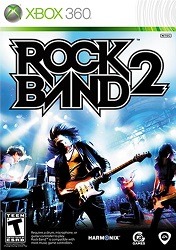
1. Rock Band 2
What can I say about Harmonix and Rock Band 2 that I haven’t already said. As the creators of Guitar Hero and Karaoke Revolution, Harmonix had already established themselves as the leading rhythm game developer, but Rock Band and its infinitely improved sequel combined everything they have learned and brought the genre to levels not previously seen. So much so, that even with RB2 being over a year old, their competitors, with 6 games released since RB2, haven’t even come close to eclipsing the sheer quality of the Rock Band product. I still play a decent amount of Rock Band 4 and the disc exports from previous games added value on top of value. Since this is a personal list, RB2 being at the top makes perfect sense, but I might have to go back and redo this with an updated opinion. Something just doesn’t sit right with how some of these landed.
I know that the last one there was pretty predictable, but again, this is my list. I encourage anyone else to share their 10 below and lets start a new decade with some strong titles. Tony Hawk Ride, we’ll try to forget about you…okay. Wow, Tony Hawk Ride, just sitting there, catching strays. I throw it in like it was some landmark of bad game design. What a dick move.
Yeah, I’ll probably redo this list, and while I’m at it, I’ve got the ‘10s I can dive into. See you next time!
Cheers
#rock band 2#uncharted 2#lumines 2#bioshock#super mario galaxy#shadow of the colossus#burnout paradise#super smash bros melee#the orange box#metroid prime trilogy
0 notes
Text
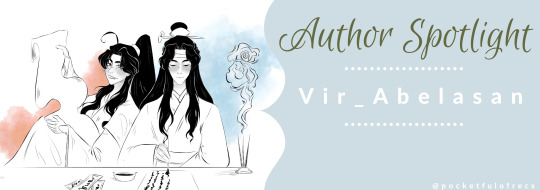
It's Friday and we're here with another Author Spotlight!
It’s impossible for you to be in this corner of fandom and never have heard of Vir_Abelasan. She has written some of the most interesting Wangxian fics we have read, a shade darker than usual, but so engrossing. When we want to read something a little savory, we go back to this author.
She has written 49k words in 5 fics, and we can’t wait to see what else she will come up with.
Her fics:
It’s we that you are for - [explicit | 2.5k | LWJ/WWX/LXC pwp]
to be wielded by your hands (our post) - [mature | 3k | competence kink]
Visitations - [mature | 18k | wip | modern au - corporate espionage]
Like stones on an unseen board - [not rated | 11k | dark lan wangji]
Symmetry (our post) - [mature | 13k | dark sizhui]
Dee’s favourite: I love Symmetry but my favorite happens to be Like stones on an unseen board. I have a special fondness for dark LWJ who is just as devoted to WWX as canon LWJ is. This fic has the potential age difference and teacher-student relationship but they don’t really get together in it. I like that, I like how LWJ recognizes how Jiangs are dimming WWX’s light and does things to get WWX away from them, even if it involves manipulation and subtly widening the divide between the Jiangs and WWX. Dark in a way that eventually benefits WWX.
Ju’s favourite: Ohhh I loved Symmetry. I loved to see JC getting his just deserves by Sizhui. The fic is very dark, and in many moments I was completely blown away and so angry. I love when reading makes me feel things, and I felt a lot of things reading this one. But as dark as it gets in some points, it makes sense in the story. And then we get a happy ending that is so good and perfect. Made me cry.
The Interview:
Q. When did you start writing fics? Did you have fandoms before this one?
A. Somewhere around the early 2000s with the Buffy the Vampire Slayer fandom, and BtVS was very prolific with crossover, which just led to more fandoms, mostly Western TV series. I wrote a lot of the Dragon Age trilogy afterwards, and a lot of Pacific Rim before finding MDZS.
Q. What made you start writing for MDZS?
A. Honestly at first I was here for the porn, because the Wangxian porn is bountiful and tender and exquisite. But then I read the novel and was enamored with how much more nuanced everything was, especially the many recurring themes and motifs related to social classes and personal vs familial/communal responsibilities, which as an Asian person you don't often get to dig into in the oftentimes Western-leaning fandom spheres.
Q. What’s your favourite fic you’ve written?
A. In the MDZS fandom it's Symmetry, because it's literally the fic I wanted to read upon completing MDZS but was not able to find. One of the saddest thing in canon for me is the lack of consequences for any of the gentry cultivators' actions in the past, and while it's realistic to the world building, I just really want an alternative where someone could go around an inherently broken system and make it so perpetrators actually pay for their crimes and less people in general becomes collateral.
Q. What’s your favourite type of fics to read?
A. Smut, because I'm just really bad at writing it. And oh, how the MDZS fandom delivers - Pure smut, sad smut, painstakingly tender smut, existential smut, it has everything! But Wangxian smut in particular is almost always a treat because there's just always that undercurrent of trust and having a person who's just for you in every sense of the word despite everything else happening. It's such a good, affirming feeling.
Q. What’s your favourite comment? Or type of comment?
A. Any comment is always a delight! From just incoherent screaming to details of which lines spoke to them the most, every comment is a reaction and stories are out there to create conversation in the first place.
Q. What motivates you to write?
A. Writing has always felt like problem solving to me, and fanfics in general has always been really interesting to write because there's the inherent conflict and problems written into canon, but also the matter of the fandom's perception of the source material to play with and solve.
Q. Who’s your favorite author?
A. There's so many fanfic authors throughout the years who are just amazing and hit a lot of very profound places a lot of published works didn't go to, so it's really hard to choose just a few. But thank you, every single fan author out there, you've really made a lot of people's days (and lives) better with your writing.
Q. What is your favorite trope to read and/or write?
A. I'm particularly fond of the trope of characters who are normally amicable or accommodating just going apeshit, both literally or figuratively. Because both in fandom and in real life, kindness and compromise in someone are often mistaken as a free pass for others around them to be terrible.
Q. Do you have any advice for new authors?
A. Write what you feel strongly about, I guess? And it's sometimes helpful to have an objective to the whole thing, for the times when it seems the story is going nowhere or you get stuck in a particular aspect of it. Sort of like a thesis statement, so whenever you fumble you have something to refocus on.
Q. What do you think is the most important element in writing? Plot, characterization, relationship?
A. Characterization carries you a long way since they're the vehicle to bringing the readers to where you intend them to be, but I also feel like structure helps a lot with stories too. Just the way you scaffold a narrative, like laying down the kind of path you want your readers to follow and experience along the way to the end.
~
Check out their stories on ao3 and remember…
Comments and kudos feed the author’s soul.
38 notes
·
View notes
Photo
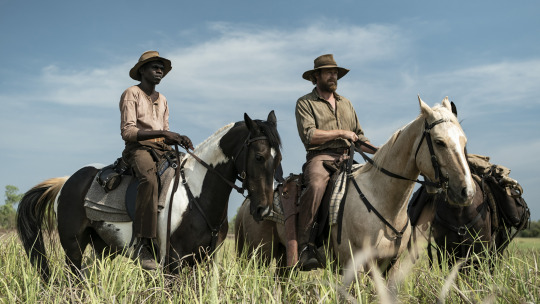
High Ground.
Australian director Stephen Maxwell Johnson tells Letterboxd’s Indigenous correspondent Leo Koziol about his revisionist new meat-pie Western High Ground, working in a ‘both-ways’ style, and how he approaches the question of story sovereignty.
“Maybe we’re all feeling a little more vulnerable, a little more open to thinking about who the fuck we all are in this world.” —Stephen Maxwell Johnson
Note: this interview may contain images and stories of people who have passed away.
Not every Western has a ‘Croc Spotter’ in its production credits, but Australian Westerns are in a league of their own. The genre has long been a staple of Australian cinema; the world’s first narrative feature film is considered to be Charles Tait’s 1906 bushranger yarn about the Kelly Gang. While the likes of outlaw Ned Kelly have made good Western fodder for more than a century now, recent entries in the sub-genre—known colloquially as meat-pie Westerns—are starting to look a little longer and harder at the relationship between British colonizers and the Indigenous peoples of the Great Southern Land.
This year brings two such tales: Leah Purcell’s feminist western The Drover’s Wife: The Legend of Molly Johnson, which made our Best of SXSW 2021 list, and Stephen Maxwell Johnson’s High Ground, which was executive produced by a community of Aboriginal activists, including Witiyana Marika, one of the founding members of groundbreaking Aboriginal band Yothu Yindi. (Marika is also in the film as tribal elder, Grandfather Dharrpa, taking on a role that was intended for Aboriginal great David Gulpilil, who has retired from acting due to ill health.)
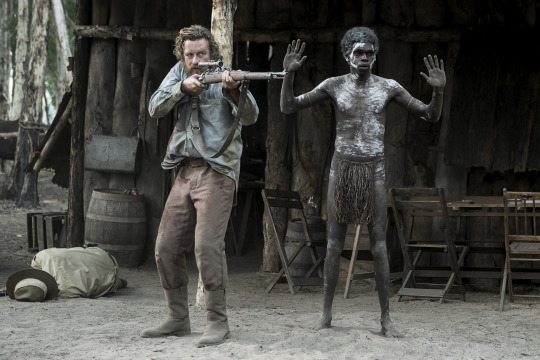
Simon Baker as Travis and Jacob Nayinggal Junior as Gutjuk.
Set in Australia post World War I, and based on true stories told by the traditional inhabitants of Arnhem Land, in north-eastern Australia, High Ground opens with—content warning—a brutal massacre by white Australian police of an Indigenous family. The story soon pairs Gutjuk (Jacob Nayinggal Junior, in his impressive screen debut) with bounty hunter Travis (heart-throb Simon Baker, in gnarly outback mode) in a manhunt that brings the opposing forces of colonizers and inhabitants to a head.
Nayinggal Junior, the grandson of Arnhem Land traditional owner Jacob Nayinggal, was not yet born when Johnson, who is a white Australian, began the long process of developing High Ground with his Indigenous partners, whose oral histories informed the film’s plot. Johnson’s connection to Yothu Yindi and his partners’ community goes back over 30 years; he directed the original music video for the band’s 1991 international hit ‘Treaty’, the first Indigenous-language song to chart prominently in Australia.
This is Johnson’s second feature film connected to the Yolngu communities in north-eastern Australia; the first, Yolngu Boy, is a coming-of-age story of three young friends on a journey to Darwin after one of the boys lands in trouble. It has been twenty years since that debut, and High Ground has been a labor of love in the time since.
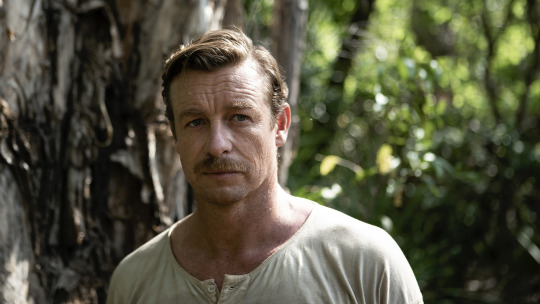
Simon Baker in ‘High Ground’.
The film takes its sound design from the land and its inhabitants, turning the volume up on birds, insects, snakes, gunshots and Aboriginal song. Expansive cinematography makes sure to place characters within the context of their surrounds—a constant reminder that the land is bigger than anything happening on it. “Brutal in all the right ways, and as honest as an Australian colonial Western should be,” writes Coffeenurse. “It’s really something how the Australian Western has become the way for Australian cinema to explore the weight of colonialism and imperialism in our history and culture,” agrees Smoothjazzlord. “Stephen Johnson doesn’t shy away from complexity and I appreciate that,” writes TheEllamo.
I spoke to Johnson at length about his “both-ways” journey of bringing the film to the screen through collective research, song and storytelling.
Notes: ‘Blackfella’ and ‘whitefella’ are informal, self-descriptive terms often used by Indigenous and Aboriginal Australians and their friends. Johnson makes several references to ‘makaratta’, an intricate Yolngu term that describes the process of coming together to face wrongs, reconcile and make peace, and to ‘Country’, which is an Indigenous colloquialism describing one’s association with one’s own land and family.
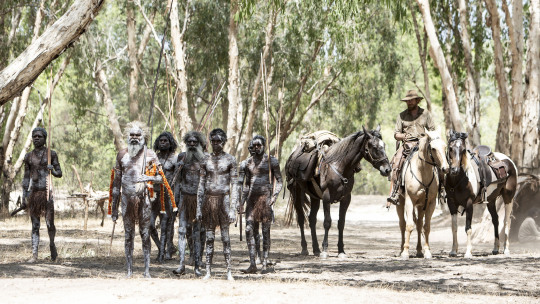
Witiyana Marika (second from left) and Simon Baker (on horse) with Yolngu cast members.
Tell us how the story of High Ground came about.
Stephen Maxwell Johnson: I was very fortunate in my life to have had two parents who explored the world. I grew up in the Bahama Islands, in Africa and they came to northern Australia. My father was an educator of the Yolngu people, and really, my friendships and my associations in my life have been about growing up with Indigenous cultures and people.
I've never really been disconnected from that, and the stories I grew up with—things I’ve heard, ceremonies I’ve seen—were very much a part of my education. I went to school and the stories I’m hearing, all the whitefella stories about Captain Cook and the invasion and what happened, no one ever wanted to go any deeper or open a story book to where it all began, and how old it actually all is.
As you know, it’s the oldest living culture on Earth, it’s an amazing connection to Country and the stories and the songlines. So, we came together, we made a decision to tell a story of the resistance that became High Ground, over many years sitting on Country with old men and women and family and drawing inspiration from true stories and true characters, then putting together what was obviously a fiction (but so is history).
It was about wanting to tell a deeper truth, but to create a film that was entertaining, so it really drew you in, and allowed you to come out the other end to perhaps reflect and rethink the Australia story, and, really, the greater human story about who we all are.
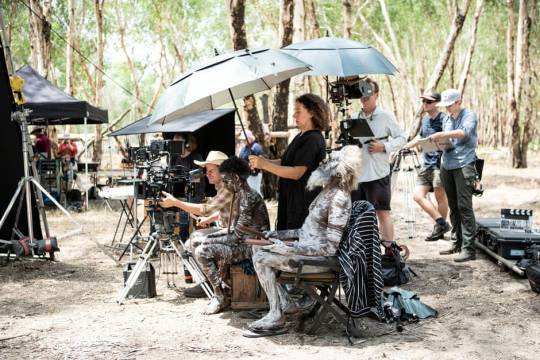
Witiyana Marika (front, seated) on the set of ‘High Ground’.
A unique aspect of your film is that Yothu Yindi band member Witiyana Marika is a producer. How did you connect with Yothu Yindi and establish those friendships?
Well, I did pretty much all of the Yothu Yindi stuff, I made ‘Treaty’ and ‘Djäpana’ and all those clips that the band did. I directed and photographed all of that stuff. For many years, anything that was Yothu Yindi, I was there doing it. Witiyana and Mandawuy [late Yothu Yindi frontman Dr. Mandawuy Yunupingu] were two of my dearest, dearest friends—my father actually knew Mandawuy back in school days, so there’s a deep and long connection there. Witiyana picked up the mantle after Mandawuy passed away. It even goes back further than that, to discussions with old man Bill Neidjie and Jacob Nayinggal, who sort of drew up the battle lines and helped create Kakadu [National Park].
Jacob Junior Nayinggal, he’s been born and became the lead actor; his grandfather would be so pleased that his grandson ended up being the lead actor in this film. ’Cause it was always about getting a Yolngu hero leading the story of the resistance, which was what it was called back in the day.
It’s really been a both-ways journey. That’s what everything that Yothu Yindi sang about, was that idea of bridging between two cultures, that idea of coming together and sharing knowledge and respecting each other. That balance—makaratta. That’s been my journey. That is the journey.
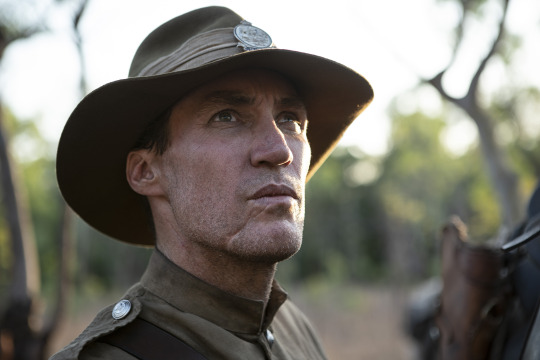
Callan Mulvey as Ambrose in ‘High Ground’.
A big issue for people in the Indigenous film community is storytelling sovereignty: “nothing about us without us”. Do you feel that the community working closely with you to make this film meant that you were telling their story in the way they wanted it seen and heard?
Well if you have a look at the credits it sort of says a lot about the process. Twenty years working together. As I said to you, I don’t see myself as a whitefella over here and they’re blackfellas over there, I see [us] as being human. They’ve been my dearest and closest friends all my life. This is us sitting down, together. Listening. Learning both ways. Bridging the gap and wanting to tell the bigger story about this country.
In this country there’s a very big story to be told. It has two different perspectives and it was about getting that right and spending the time together right. It is very much a Yolngu story; everything has been meticulously researched, and spoken about, and sung. The producers, the executive producers, all the creators in the film are predominantly Yolngu people, right across. Everything is ultimately connected and it is very much the voice of this land that we wanted to shine through in the story of High Ground.
That sort of thing came back in the day, when I made ‘Treaty’: “What’s a whitefella telling [our story]?” Are you kidding me? Mandawuy had the same reaction, he said “We’re doing this together”. Christ almighty we’ve known each other for a lifetime and we’re working together creating and telling stories. There you go. Simple as that. If anyone’s got a problem with that then I think they’re the one with the problem.
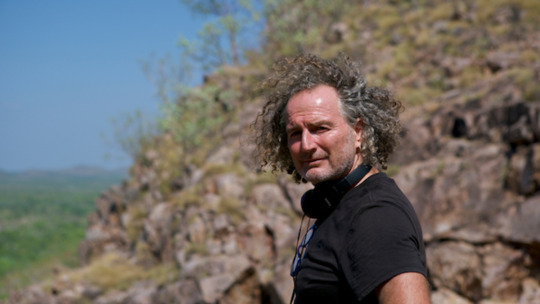
‘High Ground’ director Stephen Maxwell Johnson.
Certainly, Yothu Yindi itself was comprised of both blackfella members and non-blackfellas.
Exactly. Exactly. Look. I’ve grown up with blackfellas from right across Arnhem Land, and it’s been nothing but a deep and beautiful, profound friendship. I’ve never seen it as me and them. We’re just humans. We are one. We share, we care, we love, we laugh. There is so much to be learned from the ancient culture of this country. And the land and the language and the people.
It’s a beautiful thing having that kind of connection and immersion in that world. And that’s been my life story. I’ve been very fortunate to have had that. A lot of people don’t get that experience… being able to work so closely and so deeply with my friends—and family; I was adopted in, as well.
And can I tell you, every single person in Arnhem Land is so proud of this film, it is their film. Their story. It’s been their creative process as well. Every person who is involved in the crew and the journey of the film has had a life-changing experience, for the better. We just hope that the film and the story do help contribute to that bigger conversation, that idea of makaratta and sorting out the shit and getting on with a bit of truth telling.
How was the reaction in the Aboriginal community? Have you had the opportunity to take the film back to the people in Arnhem Land, to have screenings there?
First thing we did. With the elders, that’s what we all planned. They said, “right, as soon as we’ve done this, the first thing we’re going to do, we’re going to bring this back to the families and show it to the families first.” And that’s precisely what we did; we took a big screen out into Arnhem Land, and put it out in the bush, for the families to watch. It was an amazing experience.
Let me tell you, the screams and the applause, and the laughter and the tears, when they saw the film, on their Country. Their film. Their story. Obviously they can listen to the language and the songlines in the film in a completely different way. It was beautiful. I almost couldn’t stop crying. That sense of pride that everyone had in the film, they just own it. It’s theirs and it’s everyone’s. It’s a beautiful way to create something.

The community screening of ‘High Ground’ on the Gunbalanya football field in West Arnhem Land, Australia.
Did you manage to have those screenings happen before Covid-19?
Well, no. The Northern Territories, as you know, was clear. I had to go into quarantine and once the Arnhem Land bio-zone was relieved just a little bit, we took the film out. We had to hit the pause button with Covid, but [then] we did it. People just drove, and flew, and walked from hundreds of miles to come to the place where we blew up the screen and projected the light.
That’s a wonderful story. What’s the reaction been from mainstream Australia?
Look, very, very good. [The film’s distributor] Madman said it made double what [they] thought it would in box office. I think we were fortunate maybe in some respects coming on the back of Covid-19. Maybe we’re all feeling a little more vulnerable, a little more open to thinking about who the fuck we all are in this world. There is this kind of turning of the tide, now, of people and of a new generation wanting to learn and understand about our connection to Country.
We’re blessed with, you know, what we have right here. We need to nurture it, take care of it, respect it, celebrate it, dance it, sing it, talk it. It’s a beautiful thing to be able to tap into.
Thank you Stephen so much for your time. I just want to say I was thoroughly engrossed by your film. It was powerful, it was important. I found particularly the scene in the middle, where a Treaty signing was hinted at: that would have been a cathartic moment for the people of Arnhem Land? To think ‘that could have been what our people had done in the 1930s’, instead of the lack of a Treaty, which Australia has never had. All power to you and everything you’ve done.
That’s beautiful mate, and I will say, just one lovely parting thought here, you know yes, it’s my work, but honestly it’s such a team effort. Such trust, such great friendships and collaborations to create something like this. It’s no one fella’s effort, it’s an incredible team effort.
Related content
Meat-Pie Westerns, Kangaroo Westerns, Australian Westerns: a Letterboxd HQ list
Always Was, Always Will Be, Aboriginal Land: Troy’s list of the best of Aboriginal and Torres Strait Islander “Australia” in film and television
Australian Aboriginal Movies: an extensive list by Wayne
Australian Films Worth Your Time: Jacob’s list of Ocker cinema
My Name is David Gulpilil: Molly Reynolds’ new film celebrating the actor’s extraordinary life
Follow Leo on Letterboxd
‘High Ground’ is available now on digital and VOD via Samuel Goldwyn Films.
#high ground#stephen maxwell johnson#simon baker#callan mulvey#australian cinema#australian film#torres strait islanders#aboriginal and torres strait#aboriginal#aborigine#aboriginal film#northern territory#arnhem land#yolngu#witiyana marika#Jacob Nayinggal Junior#yothu yindi#indigenous film#indigenous cinema#letterboxd#western#meat pie western#kangaroon western#australian western
25 notes
·
View notes
Text
January 17, 2021: Atomic Blonde (Epilogue)
I genuinely really enjoyed this film! And then...about 2 minutes after it ended...I started to think. And I continued to think. I wrote those two posts, and then took a little bit more time to think.

And then...I came to my final realization.
John Wick REALLY screwed this movie. Because the perception of this movie for most, myself included, was that of a new John Wick, with a female protagonist. A lot of people referred to it as “Jane Wick.” But it’s definitely not John Wick. It’s trying to be a spy movie, especially like James Bond films.
But the problem is...it isn’t either. To be a spy movie, it tries a little too hard with a pretty standard plot. And then, it intercuts that with John Wick-caliber fight sequences, detracting from the spy movie aesthetic. And then, because you do have those fight scenes, but still need to fit in the spy stuff, it creates a distinct disparity in tone and pace throughout the movie.
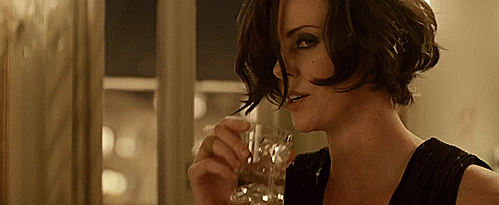
In other words...let’s get to the Recap. I have some more thoughts. And don’t worry! Many of them are positive. Just...not all of them.
Recap
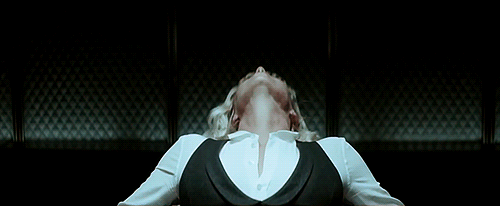
Cast and Acting
Let’s start, of course, with Charlize Theron. Outside of the action sequences, Theron goes well as Broughton, portraying the tough character traits we see in spy characters like her and James Bond. And with the character she’s given, Theron does wonderfully. James McAvoy, on the other hand, seems like he’s having a HELL of a lot of fun with his role. He’s an underrated actor, honestly, and it’s very cool to see him play this sort-of anarchist punk spy. Sofia Boutella also deserves a shout-out for Delphine, playing her character’s naivete well, as well as remaining likeable. Also, Bill Skarsgård deserves a shout-out! I liked Merkel a lot, even despite his shorter screentime. Goodman, Jones, Marsan all do fine in their roles. The USSR characters...eh. They aren’t really given much spotlight...which is weird, given the fact that this is a Cold War drama, but OK. Basically, we’re going with an 9/10. Great; not the best I’ve ever seen all around, but still great!

Plot and Writing
Yeah...here’s the thing. I might like this movie, but the plot’s kind of a massive mess. Writing’s fine, but the plot is both extremely cliche spy movie, while also being extremely muddled in terms of story. Remember what I said up there about this film trying to be both a spy movie and John Wick, and that not working really well? Yeah, basically that. It attempts to balance the two concepts, but also corrupts what makes those concepts work in the first place. The Bourne Identity is arguably a better version of that combination. It’s too bad, because elements of the plot really take away from the rest of the movie.
And then...there’s the tacked on ending. Because, yeah, the whole American spy thing? Wasn’t in the original graphic novel. What I genuinely think they should’ve done was end it RIGHT at the interview’s terminus. Or, at least, right as she greets Bremovych as Satchel, as is done in the original novel. And, just to be clear, I thought this BEFORE reading the book. That ending feels...pander-y, for lack of a better term. I realize that we always want our protagonists to be heroic, but how great would it have been if Lorraine actually was kind of a villain? I dunno, I think not adding that extra twist at the end makes the movie stronger and more provocative, in a good way. Sorry, Kurt Johnstad, I know you did a good job on a technical standpoint, but...5/10 here.

Directing and Action
David Leitch, Jonathan Sela, and Sam Hargrave, the director, cinematographer, and stunt coordinator/fight choreographer, respectively. Full points for the action sequences, because MAN, those were some good action sequences! Rough and gritty, but extremely well-choreographed and shot at the same time, the action deserves the praise that it’s gotten. How about the cinematography? Stylistic, and very bold colors make this film very memorable. But...they don’t have much clear tie-in to the theming, and I think there’s some missed opportunity there. And the direction overall is great, even if I don’t think it’s perfect. It is Leitch’s first film as solo director, after all. 8/10!
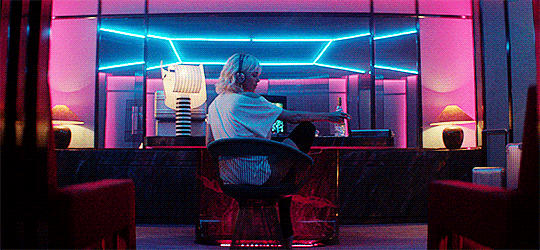
Production and Art Design
Changed the title of this section! Turns out that I’ve been conflating the two concepts, so let’s include them both from now on, shall we? But OK, what did I think of it? Costume design was iconic...in the case for Charlize Theron, at least. James McAvoy a little bit, too, but it’s clear that Cindy Evans focused more upon Charlize than anyone else in the film, really. Which, for a spy, isn’t the best of ideas. Still, that combined with Zsuzsa Kismarty-Lechner’s art direction for the sets and set pieces (almost all of which are splashed with graffiti, in a very 1980′s flair) do bring you back to the time period in which the film is set. This, of course, is also due to the work of David Scheunmann, the production designer who’s actually from Berlin, and whose experiences were vital into making this film look as good as it does. If you’re not sold on the set design, check out the differences, obvious and subtle, between West and East Germany in the film. While some of it is clear, some of it carries some surprisingly subtle messaging (Stalker and Tetris, for example). So, even if Charlize got most of the costume attention, a lot of credit should be given to this movie. 8/10 for this one!
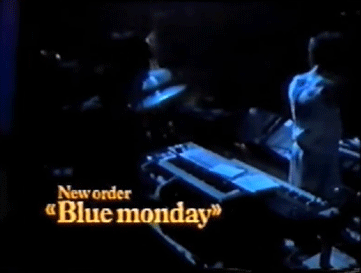
Music and Editing
Maybe the most well-known aspect of this movie, outside of the dramatic lighting, is the ‘80s soundtrack. Some love it, some criticize it quite a bit for overwhelming the film. And honestly...I think they’re both right? Here’s the thing, the music is great, and some of it is used in unexpectedly creative ways that critics didn’t seem to pick up on. Biggest and best example of this is Nena’s 99 Luftballons. That song if you didn’t know, is inspired by the separation between East and West Berlin. It’s literally a song about the cost of political strife, leading to war between countries over something as trivial as a red balloon. And when do they play it during the movie? When Bremovych is waging interrogating young East Berliners celebrating the culture of the west. It’s surprisingly profound! However...using Flock of Seagulls’ I Ran during a chase scene is...less so. That’s one’s a little on the nose, let’s be honest here. And that basically sums up the music for the movie. It’s all good music, but it’s either used well, or it just isn’t. Also, there actually is music composed for this movie, by Tyler Bates, and it is good...but I had to listen to the soundtrack to remember that it was even in the movie. So, yeah, not fantastic.
OK, how about the editing? The flashback sequence intercuts as part of the movie have been criticized by some for interfering with the pace and tone. And...eh. Wasn’t too much of a problem for me, to be honest. And other than that, it didn’t stand out too much to me. I’m finding that editing is the hardest thing to judge in these movies, but who knows? I think this little project might improve my film judgment skills. Also, those long shots? Not true long shots, as they were edited in post. So, good job to Elísabet Ronaldsdóttir! Overall, though, this category’s getting a 7/10 from me.
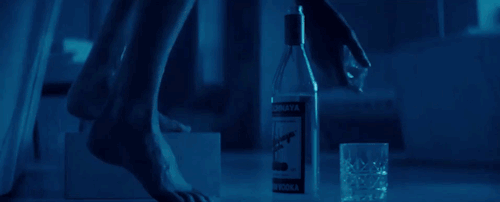
That’d be a...68% Really?
I’m legitimately surprised, because I do like this movie! Really, I do! But breaking it up piece by piece...it’s only really OK. My personal preference doesn’t necessarily dictate my score, and vice verse. So, I like this movie...even if it’s not as good as it can be. It’s a distinctive and stylish film with great action, and if you wanna see Charlize Theron be cool and kick ass, then WATCH THIS MOVIE!
And by the way, I didn’t touch too much upon the fact that this is the rare bisexual protagonist, and this is Tumblr, so I know that that’s something you guys know. And honestly...eh. Fact of the matter is that it’s a part of her character, but...we don’t really get to know the real her throughout the entire movie, so...is it? I’m honestly not sure. But, representation is representation, I get it. Also, fun fact, Delphine actually is in the graphic novel, but as a guy. So, interesting change, that!
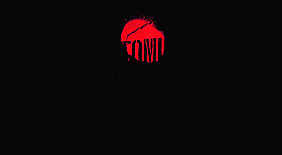
OK, I think we’re done with the spy movies for a bit, now. Let’s switch subgenres a day. Let’s inject a little more adventure into this month, and let’s trade fists...with swords. It’s swashbuckler time.

January 18, 2021: The Mask of Zorro
#Atomic Blonde#David Leitch#Charlize Theron#Lorraine Broughton#James McAvoy#David Percival#Eddie Marsan#John Goodman#Toby Jones#sofia boutella#Bill Skarsgård#roland møller#365 movie challenge#365 movies 365 days#365 Days 365 Movies#365 movies a year#user365#movie challenge#action january
29 notes
·
View notes
Text
The Invisible life of Addie LaRue Book review
This book was a love letter to New York and France albeit a pretentious one. The writing style is compelling it could have been an outstanding book if it wasn’t so vapid and shallow. Wanted to love it but I would still recommend to read this book to make up your own opinion about it. *this is just my humble opinion*
*SPOILERS*
This would have been a better book if there was a more profound lesson, however the ending just validated her need to be remembered and to leave her mark on the world e.g henry writing a book about her. If the ending was about her being remembered but not solving the gaping sadness she had it would have been better.
Long story short she sells her soul for time but no one can remember her. She spends 300 years being an art groupie (muse) and a parasite (stealing, cheating and freeloading off other people). She hasn’t really used the years well or practically and doesn’t have anything to show for it besides the gaping loneliness she has. Which also brings to mind why would you choose to live like this? To spite the darkness (Luc) who cursed her. She is driven by negative emotions, revenge, spite and pride. She doesn’t take ownership of the situation she is in, she merely blames the darkness and used him as a vehicle for her hatred and blame. She played the victim but all her woes were self-inflicted. She was so needy and consumed by the need for validation. History was unfolding around her and she is just consumed by herself. She is complaining about men and their easy way through life but Luc is always having to save her when she is in trouble. Luc proceeds to have an unhealthy obsession with her, they become lovers and when they have a falling out he plots to win her back because he “needs her”. Why do women think that having a hot guys stalk you and obsess over you is SOOO romantic and flattering. Why does Luc kiss Addie but not Henry when they seal the deal?
The main problem I have with the book is the main character Addie. We see her doing things, meeting people and reacting to events but drinking tea does not substitute for personality. Being able to read in other languages and playing piano are hobbies not character. If anything the lack of any meaningful personality portrays her as shallow but this could be intentional. The only thing we know is that she doesn’t want to be like all the other girls in her village who gets married and lives a boring life in the small village. She wants to be remembered. And she is a dreamer. There is a sense she is an NLOG (Not like other girls). The support characters point out how special, “timeless” she is and her seven constellations freckles.
Of what little we know about her she seems like a narcissist with delusion of grandeur. The contempt she has for other village girls who marry and belong to someone else. She spent 300 years chasing the glorified idea of being remembered, leaving her mark on the world for her life to matter, to be credited to art about herself. The scope of the book felt very small in a sense that all artworks can be eventually be destroyed over time so the fact that she was obsessed with leaving a mark on a medium that could decay. The darkness talks of stone wearing away but in the grand scale of things 300 years is not that long and pieces that were acclaimed 300 years away can be forgotten (the author was selling a concept but it didn’t go in for the finishing kill).
The author talks about ideas and how powerful they were but why didn’t she use that power to introduce good ideas to help women like her into the world instead of ideas about her. Addie also had lots of rich entitled women hobbies and interest. She was worldly because she appreciated art and culture. She knew all the trendy bars, watched the right classic movies and read all the right great literature. Speaks so many European languages. It would have been easier for her to go overland to Turkey, Jordan and China than across the Atlantic via boat. But that is what feels wrong about this book she had so much lust for the world and adventure but only for Europe and America. I understand that she could not be invisible in Africa and Asia but she could have gone to Australia, New Zealand and South America (she spoke Spanish). Didn’t she want to see where elephants come from? but this is a very Karen move pretend that the non white European countries don't exist. There were flashbacks of places she had been it felt like name dropping people and places. She was a collector of people and experiences for the grandeur of it. Which also bring to mind why she thinks she should be remembered when so many people throughout history and time are forgotten like her parents and the friends she left behind.
The most uncomfortable notion is the fact that she dates mostly people in their 20s, when she is so much older. She is like an equivalent of a creepy talent scout preying on new talent.
Henry’s character is much better written because his story is more relatable but his story wore on you. Still it felt like he was there to validate how exceptional Addie is.
“Addie is so many things, thinks Henry. But she is not forgettable. How could anyone forget this girl, when she takes up so much space? She fills the room with stories, with laughter, with warmth and light.”
Are we talking about the same person? I could not see that on the pages, Addie was too self-absorbed to be the positive beacon of a person Henry describes. The romance between the two was flat, two hipsters going out on dates (art exhibits, food trucks, trendy nightclub) is not quite entertaining. It really felt like they just happened to be the only person at the right time. Her sacrifice in the end was not for him but for her and how she couldn’t bare for him to forget about her.
We will never know why the darkness want souls, what does it use it for? What is so important about souls for the darkness, does it eat it, is it an energy source? Shallow with no depth but a whimsical romantic aesthetic.
It wants to be profound but fell flat. I wanted to love it, there was good elements to this books but as a whole... If you didn’t think too hard superficially you can enjoy it. The writing is flowery and beautiful but lacking any real plot. This book felt more like an American middle age woman writing about her idealised version of a French woman. Addie was written like a modern women instead of a “timeless” women in a modern world.
18 notes
·
View notes
Note
I kinda wanna hear your thoughts on NiGHTS, if you don't mind me asking. I just really like your speculation/headcanon posts!
I have great affection and great frustration for NiGHTS, honestly.
There’s a lot to love about the series. It’s got exquisite visuals and a really cool concept. While the gameplay isn’t completely my cup of tea, I think it’s a novel innovation. The designs of Nights and Reala, their bond and conflict, are really interesting and Wizeman’s a pretty impressive chunk of cosmic horror. I even feel like some of the dislike of Owl in JoD was unwarranted; yes, he was made the face of the slightly clumsy tutorial mechanism but it’s hard for me to not care a little that Nights, who is privately lonely in ways they seem disinclined to admit to anyone, clearly has some mutual fondness for this fussy bird dad.
But I definitely feel like the games have their problems- and I’ll focus here mostly on JoD because I feel like NiD itself was a pretty minimalist piece flying more on emotion than deep lore and it was successful in that regard.
I feel like JoD in particular struggled to decide if this was a story about Nights and Reala or a story about Will and Helen, and while they could’ve made room for both, it would’ve required more integration than they pulled off, and it ultimately weakens both narratives.
Nights never really meaningfully reaches a conclusion with Reala. They get angry enough to hurt him, feel bad about it, Reala goes on to take their new friends hostage, and Nights gets angry again and, seemingly, finishes Reala off, either personally, or indirectly because their attempt to kill Wizeman would affect Reala too. Even the nature of their sacrifice is hampered here because they don’t really sell us on what it is about Will and Helen that makes things so different. I take issue with the short-lived archie Nights’ comic’s invention about the “two perfect dreamers born once a century” but it at least explains all the hullabaloo about these specific people. I don’t mean that to be callous- but there has to be a reason Nights makes their stand here and now, even if it’s for internal reasons rather than Will and Helen, and we don’t get a sense of why that is.
Will and Helen themselves have the seeds of interesting or compelling problems, but they aren’t really brought home either. The conclusions they make don’t really feel of a piece with the nature of their issues. We don’t really find out what about Helen is ‘fragile’, and you have to read into things to see the contrast between Will’s lonely, ‘abandoned playground’-like second dream and the vibrant potential of his third dream, this fear that if you can’t grow up people will leave you behind in childhood.
JoD takes from its roots in NiD that it is good at evoking emotions. Many of the ‘major beat’ cutscenes land with really impressive intensity and evocative qualities! I can vividly call to mind Nights and Reala’s argument in Delight City or Reala circling Helen menacingly in Memory Forest.
But I feel like the devil’s in the details. Frustratingly often for me, these vibrant splashes of story were followed up by, like... hey kids, it’s time to chase Octopaw around in circles again! This is in-universe and out a completely pointless exercise! Let’s save some Nightopians from Wizeman, never once examining or explaining what Wizeman wants with them!
I try not to gripe too hard on Wizeman’s inscrutability because he as a character at least resonates with it- that he’s only a handful of ominous details in the dark actually kind of works for his character and the jawdropping beauty of the Unconscious Space and Will and Helen’s respective leaps of faith into the sea of darkness is contrasted by a profound sense of unease. Why is this space simultaneously so real and unreal? If Nights lands on a real-world building at the end of the game, sure, they’re alive, but is that a good thing, if they’re inextricably connected to Wizeman and Wizeman seems to be clawing at the veil between dream and waking?
Again, this is not a frustration of I hate these games. It’s a frustration of, I really love these games, but they feel like a vivid concept padded into existence with inconsistent flesh where the most interesting workings of both worlds- the real world emotional problems, and the dream world’s politics and potential fate under Wizeman’s onslaught- struggle because they’re ramming into each other at cross purposes rather than intertwining and facilitating/shoring each other up. There is some unbelievably premium good shit in NiD and JoD both but the experience of those glorious moments is undercut with the disappointment of going straight from that, to, octopaw. Nights do you wanna talk to Owl about how you unhealthily use harassing this octopus as a way to run away from serious emotional talks? No?
All of this has been a big reason why I’m looking forwards to Balan Wonderworld eagerly, because, Balan Wonderworld seems to be doing the spirit of what NiGHTS was as a series, and directly answering some of the problems of JOD. The human-side dynamics are spiced up with the chapters each having their own stars-of-the-day, and we’re digging into more raw emotional territory than stage fright or a nebulous insecurity growing up- just the three released so far are dealing with unexpected catastrophe bringing ruin to months of hard work, an accident leading to medical problems and a sense of betrayal, and the ‘pettiest’ problem, interpersonal rejection, is easily the most heartbreaking because it showcases how little self-confidence that afflicted person had.
Balan’s more mature position as a maestro and a hands-off sort of narrator figure while Leo and Emma take center stage means that I don’t mind as much when the kids get focus- in JoD, while Will and Helen were kids, Nights seemed like a teenager who was disconcertingly willing to throw themselves under the bus for friends they met yesterday and this wasn’t really framed as a bad thing. With Balan, I feel like even if Balan does at some point in the narrative sacrifice himself to advance Leo and Emma, it’d play to very different tropes- the removal of the magic feather or mentor, as a lesson you have to fly on your own.
(and, Balan is an integral part of the Wonderworld itself, and I have reason to suspect Lance would have a vested interest not fully ‘removing’ him even if they at some point separated him from Leo and Emma)
The kids themselves are also shored up in terms of intrigue. I’m really excited for square enix’s involvement, because they’ve produced a few stories that dig at emotions, and taking characters from the stock of, say, Neku and Shiki from World Ends With You, who Leo and Emma have passing resemblance to (a boy who lost a friend and became disillusioned and closed off, a girl who’s ebullient and sociable and more than a little insincere in it, hiding an insecure, lonely core) I think this is very promising.
That doesn’t mean I am abandoning all love for the NiGHTS series or that I think it’s garbage compared to Balan Wonderworld, especially since they have different themes and motifs and one isn’t even out yet, but I think that it’s interesting how, to my eye, the Wonderworld game seems like a sort of continuation or refinement upon JoD- that NiGHTS in some ways seems to be an inspiration bedrock for this new theater adventure.
Ultimately even if Balan Wonderworld is everything I hope for and more, there’s always going to be a place in my heart for NiGHTS, though. (I mean, hell, Nights themselves was an instrumental force in me figuring out my own relationship with gender.)
(and, once the game DOES come out, I feel like I’m certainly not the only one who’s gonna want to write crossover fic.)
TL;DR I love the nightmare jesters from the absolute bottom of my heart but I just wish we had a little more plot to squeeze loose.
27 notes
·
View notes
Note
I agree that the Overhaul arc is poorly done, but I'm curious - what are your thoughts on Nighteye? He's one of my favorite characters, mostly because he clearly cares so deeply about so much yet he's rewarded with pretty much nothing but suffering for it. I felt like his fate was handled...absolutely terribly by Horikoshi, with it being glossed over almost immediately after it happened rather than having the profound effect on Deku, Mirio, and All Might that it should have. (1/2)
I feel like part of the reason the Overhaul arc feels so hollow is because it seems like a means to an end in introducing some new characters - Mirio, Tamaki, Nejire, and Eri, primarily - but the arc ITSELF has very little effect on anyone or anything in it once the story moves on. There’s no lasting impact; it barely even gets referenced again. And again, Nighteye’s care and dedication go largely unrecognized and unrewarded. There’s almost nothing to feel good about in the arc. (2/3 lied again)
The longest time I spent away from staying current on the manga - when I couldn’t muster the will or desire to read - was during the Overhaul arc. I think it was poorly executed all around, that the most sympathetic characters in it were unilaterally punished for their best qualities, and that what should have been important was given the same post-arc treatment as filler fluff. What are your thoughts on the problems with the arc? And what do you think of Nighteye as a character, and his fate?
I have several problems with the arc, but the biggest one is that for such a long, Midoriya-centric arc, I feel like I’ve hardly learnt anything new about him, and that he hasn’t changed much.
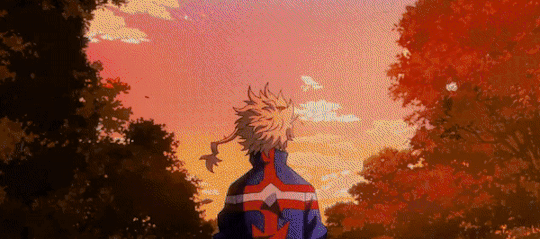
As for my problems with the arc:
1. Mirio
Mirio was obviously introduced as a foil to Deku, to show that Midoriya wasn’t the only possible heir to OfA, he wasn’t even the best choice by far. It’s an interesting setup, but one that I don’t really know what to do with narratively.
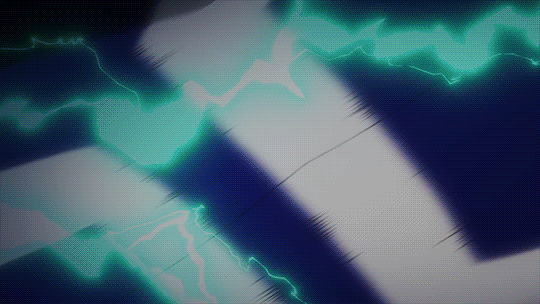
If anything, it soured my opinion on All Might quite a bit. Because he behaves like OfA is just another quirk, something he can do with as he wishes, and bestow it on a good-hearted, but naively idealistic kid with no body strength or combat experience to speak of. And I can’t help but think of all the times Deku almost died, taking OfA (a legacy quirk, nurtured by generations to be able to counter humanity’s big threat, AFO) to the grave with him, and All Might’s choice starts to feel selfish and short-sighted.
I do think at the end of the story, All Might’s choice will be vindicated, because something will make Deku in retrospect the best possible holder (my bet is that due to quirk singularity, Deku’s quirklessness will play into his advantage in hindsight), but for what we know now:
1. All Might passed up on choosing someone with a quirk to help increase the power of OfA.
2. All Might without ever considering the greater implications and wider responsibility, didn’t even look at the candidate chosen by his close allies, who did have a pure heart, had been training hard for years, managed to turn a very difficult quirk into a powerful weapon and was perfect both in body and mind. Instead, he went with a spur of the moment nostalgia, because he SAW HIMSELF in Deku - and I cannot applaud this.
Before you come @ me angrily - I don’t hate on Deku - I think Deku from his perspective deserves it, and has done as well as he reasonably could, and even going above and beyond trying to make the quirk as his own.
This is a criticism of All Might’s choice as framed by the narrative. It feels less wisdom and more selfish wish-fulfillment from this perspective.
Mirio has to fall and lose his quirk because obviously someone so much stronger than Deku cannot stay in the narrative and not bring up more questions going into the battle against Shiggy. But the way Mirio loses and Deku wins against Overhaul I feel also doesn’t have a lot of lessons - when fighting, have the right Loli-backpack with a convenient power just to make up for your current problem???
I don’t even like Mirio that much as a character - he feels a bit too perfect, a bit too powerful to be interesting to me. I like my characters flawed and conflicted.
So I think the Mirio vs. Deku comparisons didn’t really deliver anything for me. I came out of the arc not having anything convince me that Mirio wouldn’t have been the better choice and just as deserving as Deku. I don’t know what Deku learnt - he has a bit of confidence crisis, but he’s already had confidence problems, and doesn’t seem to last beyond this arc.
2. Sir Nighteye
Again, his character seems another way to make All Might less likable. We finally learn that a lot of his splendid isolation at the top of the hero-mountain is self-imposed; that he pushed away his allies and refused a helping hand.
Sir Nighteye is an idealistic All Might fanboy, a lot like young Midoriya, except he was pushed away.
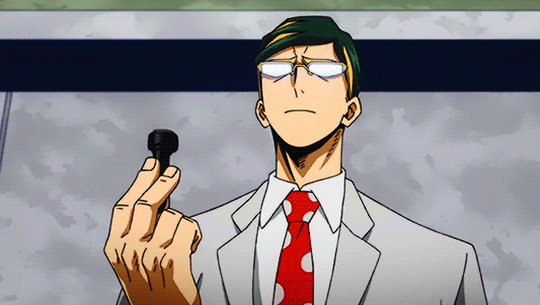
His quirk is also quite broken in many ways, which makes you wonder where did they hide him in pivotal moments like Kamino?
I honestly didn’t feel much for Sir Nighteye - he felt more like a plot device than a real flesh and blood character to me. But I feel that the points he was created to make (i.e. All Might’s behaviour in choosing Deku was reckless) were not convincingly refuted.
Yes, the story may have proven that he cannot predict all ends, that the future can be changed - but still, just because he couldn’t foresee Eri (a deus ex machina device) activating in the crucial moment doesn’t change the validity of his criticism.
I also feel that his death was a bit hollow - it doesn’t profoundly change Deku, Mirio or All Might. It’s a momentary sadness, but not a kind of emotional devastation.
3. Eri
She’s cute and all, but her power feels a bit too convenient in the sense that now whenever something horrible happens, it never feels permanent, because we are like - oh, well, Eri will just rewind that. (Mirio’s quirk, Shirakumo, Deku’s deadly wounds…nothing is of consequence.)
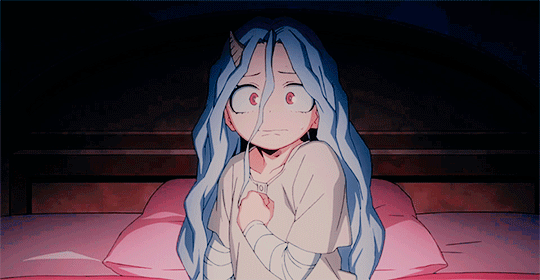
I’m not going to pass a judgement on this until we get the picture of what Eri’s power actually is, what are it’s limits, how it is fuelled - but it’s something that can break the narrative.
4. Overhaul
Chisaki had a great potential and amazing design, but I feel like him as a villain also didn’t quite deliver.
I guess he’s put in as a foil of Shigaraki. While Shiggy is the guy trying to bring on a new era, but clinging onto the teachings of his master, and has a quirk that’s only hugely destructive, Overhaul is trying to “preserve the old ways” by basically staging a coup in the yakuza, and he has a quirk that could be a powerful healing quirk, which he uses for evil?
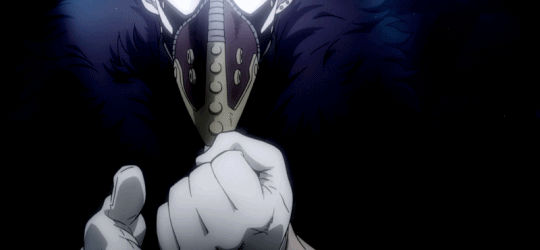
He’s also a bit similar to Eri in this - that his OP quirk could have been turned into pure good if he was saved from the yakuza’s clutches as a child. Still, in the end of the arc, I don’t have much feelings about Overhaul - nothing that really prompts me think in his ideals (like Stain did), or nothing that makes me feel empathy for him (like Shiggy’s or Toga’s backstory does), or nothing to make me intrigued (like Dabi does).
5. Too large cast - too little character development
We get introduced a ton of new characters - but in the end, the only ones I feel like I learned something substantial about are Fatgum, Mirio, Sir Nighteye and a little bit Amajiki.
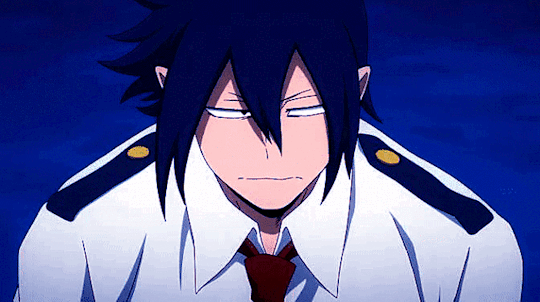
On the negative side - we leave the characters we spent the last 150 chapters learning to care about behind. We only see Uraraka, Froppy (but they are totally sidelined), Deku (who as said above doesn’t feel coming out having grown from this arc - but yeah, 100% OFA looks cool I guess?) and Kirishima (who got a decent backstory and development).

We also see Aizawa - and similarly to Nighteye - we also see why he needs to be taken out of every fight, because otherwise his presence would resolve it too fast. He has that one nice scene with Deku, showing that he probably realized that he needs to care about the emotional well-being of his students.
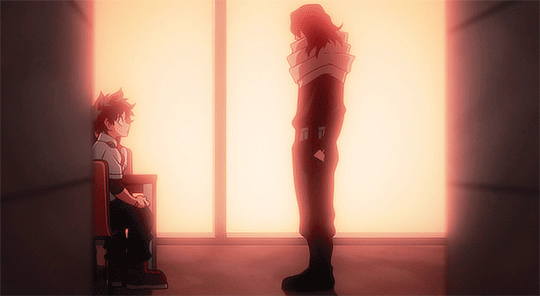
Otherwise, because we are fully following the raid, I’m sitting there thinking after 13 episodes, when will I see the class, and the characters I’ve come to be invested in again?
In the end, for almost 50 chapters and 14 episodes, the really emotionally impactful moments are few and far in between:
- Deku - All Might - change the future together
- Kirishima: Red Riot Unbreakable
- The Suneater fight
- Kirishima & Fatgum against Rappa
- Mirio standing up to Overhaul after losing his quirk
- Deku vs Overhaul (spectacular, but not very character-driven)
- Sir Nighteye death (but like I said, not as impactful as could have been)
In the end, it tried to grab too much, and it didn’t deliver a coherent whole. I think Horikoshi is better at writing shorter, more compact arcs.
I don’t hate it, but it’s certainly not one I want to rewatch or re-read and mostly I’m just looking forward for it to be over and for us to get on to other storylines.
120 notes
·
View notes
Text
24 Frames
“You thought God was an architect, now you know
He's something like a pipe bomb ready to blow
And everything you built that's all for show
goes up in flames - in twenty- four frames”
- Jason Isbell
This may come as a shock, especially to those who know me well, but I can be very stubborn. Sometimes this can work into my favor as it helps bolster confidence when I take a difficult position that I know is right, or it can help me persist when odds are long such as starting a new business. But this often is a character trait that I know can hold me back. In particular, I bristle at things I am told that I “should” do even when it clearly would be in my best interest to do whatever is being suggested. It usually takes someone equally stubborn to get me to move off of my position, but this did happen recently.
My wife is always on me to watch various different television programs, but I always balk. I watch some TV but is it well documented (on this blog) that it is pretty much limited to PBS and reruns of old game shows and sitcoms. I don’t like to leave that comfort zone, and it takes a lot for me to try out a new show – especially one that is episodic that expects you to come back week-after-week. I know that means I miss out on a lot of good stuff, but I’m okay with that as it allows me to keep my time on the tube under control and I don’t get more involved with something than I really want to be. But on this one particular show, she was quite persistent, and I was challenged to at least give it a try.
The show is Schitt’s Creek, and I am sure you have heard of it if you do not already know it well. If you haven’t seen it, do not worry, as I will not be disclosing too much about the program. Even if you have heard a lot about it and feel you know the story, part of the charm of the show is watching the characters develop throughout the series, so plot turns and the such are not as important as in some other episodic series. The basic plot is that an extremely wealthy family of four, including two adult children, are forced to move to a small town when they lose everything overnight due to a business manager not paying taxes. The series starts with the scene of revenue agents raiding their mansion as the family frantically collects a few belongings, so no time is spent on their past life. Every moment from the first scene is spent on their life afterwards which involves living somewhere in the middle of nowhere with a bunch of regular folks. It sounds like a typical fish-out-of-water setting (think the second Bob Newhart show for the closest example), and that is certainly mined for plenty of laughs, but it quickly becomes clear that the show is about much more than this.
That is all you are going to get from me about the actual show, because no more details are relevant to the rest of this post. Except that the acting in this show is brilliant and worth watching for that alone. The father and mother are played by Eugene Levy and Catherine O’Hara, both of whom I have been watching for decades in their various film roles and on the hilarious SCTV program. The chemistry between the two is so natural and genuine that you quickly adopt them as Johnny and Moira Rose and forget their 40+ years in show business as other characters. The children played by Levy’s son Dan and Annie Murphy are equally good and get a lot of the laughs as their clear lack of reality in their past lives plays to insane results when applied to the real world of the town of Schitt’s Creek. The supporting cast is not just a bunch of wacky neighbors but add much depth to the show and develop themselves over the course of the series, especially the character of Stevie played by Emily Hampshire. The character of Roland Schitt, played by Chris Elliot, may be the best second banana on television since Cosmo Kramer. Again, none of this gives away much if anything about the show or the various plot arcs, but it should give you extra motivation to watch as talent like this collecting in one place is rare indeed.
And why exactly am I so intent on you watching this show? While the quality of the program and the enjoyment it will provide you is enough reason to dive in, I have discovered a much greater purpose to following the evolving journey of the Roses. Even though the show was created over five years ago, and largely wrapped production on its sixth season before 2020, it has become for me the perfect allegory for the United States right now. Our country is going through the same experience that the Roses went through much of the first two seasons. After the sudden event of COVID-19, we found ourselves much in a place like Schitt’s Creek. Over seven months into this pandemic, we are still stuck in what life was like before and when will it ever return. I do not think this is much of a spoiler alert for anyone who is rational, but how the way things were is never coming back. COVID-19 has wreaked havoc on our society, and we like to blame it for all of our current problems, but it simply laid bare all of our faults and weaknesses almost overnight. We are now no longer able to push those existential problems aside and have to face them head on. Many of us are not up for the challenge and would like something to change things back overnight, but that is not happening. It doesn’t matter if there is a vaccine, or a new president, we have to face that we collectively lived lives that were not grounded in reality and our fates hung delicately in the balance just waiting for something like COVID-19 to come and bring it crashing down. Just like the Roses lost everything in one quick raid, we now find ourselves building our lives all over again in a strange place where we are very uncomfortable.
Now I know that is difficult to hear and very depressing, but here comes the good part. Just because things have changed does not necessarily mean that we can’t grow and develop into something even better than we had before. Obviously, a deadly disease like COVID-19 is not something we ever wanted, and it has brought countless suffering and death to too many people, but it does provide for a starting point to helping us grow beyond some of the shallower lives we lead previously. It may take a lot of tough love, but we will eventually get the virus under control and the big question will be what is next. For me, there needs to be an evolution past wherever we were before this all went down. I think our guide can be the Rose family in Schitt’s Creek. The a-ha moment for me came at the end of season two titled “Happy Anniversary”. I will disclose nothing more about it other than to say it was a transformative episode not only for the Roses, but for my own outlook on things as we move into what will be a very dark winter.
If you are a watcher of the series, some of this may make more sense to you, but I think even you could benefit from another viewing to see if you can apply some of this to your own life as well. I am actually only through Season 3 so far (I know enough about what lies ahead to be able to write this post, but it hasn’t ruined a thing for me), but I am already making plans for starting over to pick up things I missed the first time around. And it is important that you start in the beginning and move through the episodes sequentially. Not so much because you will lose the story, as many of the stories are self-contained within an episode, but because you will miss out on the character development along the way (again, kudos to the actors and actresses in this show who so brilliantly developed these characters). I know this is playing it up quite a bit but trust this one-time reluctant viewer to be assured that your time is going to be well spent.
This many come off as a review, but it really is not. I mean, if I were a reviewer, I would include some of the above in my story (and end with four stars or whatever the highest rating is), but this has become so much more for me. It has served as a life-saving antidote to the poison spewed in traditional media and social media that makes me nauseous on a daily basis. I find myself occasionally daydreaming about a funny scene I saw, or a subtle profound moment in the show, which has replaced some of the constant worry about the pandemic, or economy, or the election, all of which have a life-or-death feeling to them. It has proven to be a rare new tool in my arsenal against anxiety and it will end up being one of my lasting memories of 2020. That is a lot to say for one show about a year as particularly disastrous as this one, but I sincerely believe that.
So, don’t be like me and be stubborn if you haven’t seen this show. As soon as you read my last sentence, get yourself on Netflix and start watching with Season 1, Episode 1. And make sure you don’t have anywhere to be tomorrow because the one negative is that it will be hard to stop once you get started. But I think it is okay right now to binge on something that is finally showing us that there is a way to succeed in life without putting others down or placing selfish pursuits over relationships. So, dig in and enjoy and I promise that I have learned one other thing throughout this experience – keep an open mind. Because when you keep your mind closed, you shut out a world of possibilities, even when that world seems to have none.
Enjoy,
Jim
1 note
·
View note
Text
11/11/11 Tag
Thank you @katherinescribbles for tagging me! My answers are really long, sorry!
1 Who is your favorite character in any work of fiction and why?
This is SUCH a hard one. Do you have any idea how many favorite characters I have?? I don’t! There are too many!
For some reason, however, the very first character that came to my mind was Tiffany Aching, followed closely by Carrot Ironfounderson. Both belong to the Discworld universe written by the great Terry Pratchett.
Tiffany Aching is smart, and brave, and powerful. She takes responsibility for her mistakes and she tries (and mostly succeeds) in doing the right thing even when it’s hard or boring or she doesn’t particularly like the people involved. I haven’t actually read the last book in her series, The Shephard’s Crown, so I don’t know how her journey ends. (At first it was too painful, I felt like if I read the last book Terry wrote it would be too final and I would have to accept that there weren’t going to be any more. For the past couple years I’ve been wanting to read it but just haven’t had the time or energy to make it to a library to find a copy.) Anyway, I look forward to one day reading it and finding out who she grows into and where she ends up.
Carrot Ironfounderson is honest and upright and at first glance naïve. He’s also very clever. I’ve always loved that about his character because most people seem to take the cynical view that if you’re kind or honest or open that you must be stupid or doing yourself a disservice in some way, but Carrot’s kindness and honesty always works out for him and he’s shown to be very shrewd as well, showing that cleverness and goodness can exist in the same person. One of the things he believes that I’ve always remembered is “personal isn’t the same as important” which struck me as very different than how most people think and also profound.
2 Do you remember the first piece of writing you ever wrote? What was it?
I think the first “real” writing I did was write in the journal I got when I was … eight? I think? The first fiction writing I remember starting was about this girl who was either actually a fairy or a half fairy contacted by her people to stop an evil horde of monsters who were going to pour out of a mountain that she could see from her back yard. Or at least that was the idea, I think I wrote maybe a page of that before abandoning it. I was probably around 10 or so. I got frustrated because I couldn’t think of a reason the fairies would ask the protagonist for help specifically rather than just deal with the problem themselves. I’m honestly surprised I still remember so much about it.
3 If you could be any kind of fairytale creature, what would you be and why?
Hmm, depends on if I were stuck in that form or if I could shapeshift at will. If I could shapeshift then I’d love to be able to turn into any size dragon I wanted. If I had to choose a form to stay in forever then I’d definitely go with being an elf (LOTR movie-style elf of course).
4 What is your zodiac sign and MBTI?
Pisces and INFJ
5 How would you describe your writing style?
I just took a “who do you write like” quiz and apparently I write like Stephen King!? I’ve never read a Stephen King novel! (I don’t like horror).
If I had to describe it for myself I’d say that I like dialogue and describing what characters are thinking a lot, and focus on setting and action less than I want to/should.
Also, slowly, infrequently, and generally with little forethought (I’m more of a pantser than a planner, although I’m trying to change that.)
6 Come up with a 5 word prompt! What is it?
A fairy in the garden.
7 Where do you find most of your inspiration for your writing?
I tend to be drawn to fantasy a lot, so a lot of my inspiration or ideas for stories come from standard fantasy tropes. I think subconsciously I pull a lot of inspiration from other stories. I do it consciously some too, but try not to do that a ton, even if “great writers steal.”
I’ve always wanted to write a standard hero journey, "person leaves home town and becomes hero of kingdom” story, but I’ve haven’t worked on one in a long time because I know it’s been done a million times by much better writers. I get really frustrated and wish I could think of something new to bring to the table while still having the story recognizably fit that mold.
8 What was the last piece of fiction to make you feel an extreme emotional response over?
Avenger’s: Endgame. SPOILER ALERT. Next question bolded for ease of jumping your eyes to it. Skip to the next question if you haven’t watched it yet.
I bawled when Black Widow died. The weird thing was though that I wasn’t entirely certain why I was crying, or why I was crying so much, but something about her death made me cry so hard the first time I watched it that I missed everything from the shot of her on the ground to the shot of Clint hitting the water with his fist.
9 What’s your favorite trope?
Tough to choose one favorite, but I love it when characters get injured and are nursed back to health/cared for by their loved ones AND/OR their loved ones get really angry/protective and proceed to go destroy the thing that injured them.
10 Opinion on love triangles?
I generally hate ‘em. They’re always the same. Girl has to choose between nice guy or bad boy. It just seems stupid to me that any intelligent girl would think “this guy seems shady, I think I’ll get involved in his business and show way more interest in him than I should just because he’s handsome!” Whenever I encounter this trope it undoes my suspension of disbelief, I’m too aware that the relationships are manufactured for the drama and the story, and I can’t view them as “people I’m reading about” instead of “characters the author is manipulating for the sake of a plot”
I've probably read some that are well done and liked them, although I can’t think of any examples at the moment. In general though, especially in YA books which are the majority of what I’ve read, love triangles are just boring and frustrating.
11 Something you wish you’d see more in the stories you read?
Related to the above, more characters in YA books who act and think like real, intelligent people and not like stereotypes. Like, immaturity does not equal stupidity (stupid actions sometimes, sure, but still). It always frustrated me as a teen when I was reading about someone my own age (or older!) who were apparently dumber than me. (Like, not making bad decisions that included reasonable rational for the experience/information they had, but bad decisions that were made obviously because “the character needs to be stupid and to make this decision for the plot”)
These were excellent questions. Here are mine!
1 What is your favorite book or series and why?
2 What piece of writing are you most proud of and why? This could be anything, not just fiction writing; if you wrote a paper for school that thinking about still makes you feel good, I’d be curious to learn what it was!
3 Are you a planner or a pantser?
4 If you could live in the world any book series, which would it be? If your choice is different than your favorite from question 1, why is that?
5 Do you have a book that you love that most people you talk to tend not to have heard of? What is it?
6 Do you read/write fanfiction? What’s your favorite fandom to read/write in?
7 What time of day do you write best during? Morning? Midnight? Any time?
8 Have you ever done Nanowrimo? What was your project?
9 What is your opinion on poetry? Do you like it? Do you like modern poetry?
10 Choose your favorite question out of the 11 questions I answered and answer that one! (Indicate which one you’re answering too).
11 What was the last book you read?
asking @ofinkblotsandscript @writings-of-a-narwhal @nonchalantxfish @slothwrter @corisanna @ashesconstellation @azawrites @scribbles-to-feed-the-void @juls-writes @indievixen @sheabutterskyes (I’d love to hear your answers! When you answer please tag me so I can see!)
7 notes
·
View notes
Note
OKAY SO I've just spent the best part of an hour scrolling through your blog and reading a bunch of your destiel meta and I HAD to message you... I was one of the many people who STRONGLY believed destiel had a chance of being canon after season 8 (more like season gr8 am i right), but throughout the years I slowly lost all hope. However, S14 has made me 110% invested in the show again and YOUR META IS GIVING ME HOPE FOR DESTIEL, which is TERRIFYING. Your writing is wonderful and I'm STRESSED.
Got back from Washington late last night!
Oh my gosh @alovelikecas, your message really made my day and I’m SO glad you enjoy my meta xox (even when most of my meta looks like, to me, sloppy-ass writing, haha! I’ll probably make an end-season meta post after 14x20 — if I have the time — that touches upon SPN’s current and repeating themes since Season New Beginnings S12/Dabb Era, not to mention I have, like, some more unfinished meta in my drafts >.>)
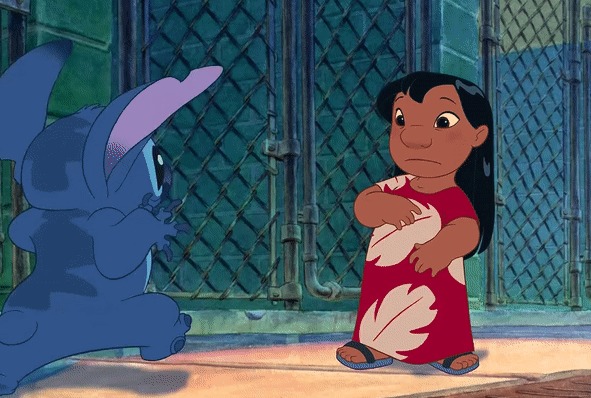
Yeah I mean, I didn’t join Destiel land until Summer 2016, and before that, I was late to the Season 11 party, so I basically had no narrative context for anything, and I’ll copy-paste what I said here:
Looking back, one significant thing I recall? S11 gave me a sense of Destiel’s true narrative validity (as not a ‘fanon’ ship but organically developed in the canon) when I perceived it as a season that was ‘missing something’. Keep in mind I had no idea about Destiel yet while watching S11 at the time.
I was literally asking myself — repeatedly — why Dean/Amara seemed to contain odd narrative holes, considering A. Dean explicitly said that the non-consensual attraction he felt for Amara was NOT love and “it scares him”, B. Amara told Dean that ‘something stops you - keeps you from having it all’, C. Djinn!Amara stated that she can: ‘feel the love [Dean] feels, except it’s cloaked in shame,’ and D. Mildred’s iconic ‘You’re pining for someone’ —> which did not logically correlate with A and C, meaning: since Dean doesn’t freely love Amara and thus isn’t possibly pining for her — with female love interests as currently non-existent (I remember crossing off the dead/gone girls on a piece of paper lol) — who the hell was he pining for, then?
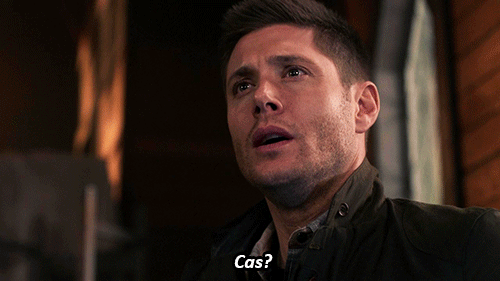
Originally posted by elizabethrobertajones
Obviously, without writing long-ass paragraphs of meta about it again in this post, S11 made sense as soon as I watched it within the Destiel context (especially after I read up on some grandiose pieces of Destiel meta (@charlie-minion was the very first person who inspired me to write meta; I followed her once I joined the fandom Oh my god, here we go, holy crap this subtext – I’m invested in this godforsaken ship because they’re in love with each other and I’m not getting off any time soon. The rest is history.
I’m aware that I do come off as positive (and I’m still Destiel-positive; whatever happens in 14x20 this week may or may not change that), but I hope you don’t mind if I use your lovely ask as an additional opportunity to clarify my meta standpoint: no one’s saying Destiel WILL become text.
The general Destiel meta community (all subfactions: Destiel-positive, -negative, -neutral, and in-between) is not the Most Holy Canon Word, and we aren’t SPN writers, and again, we can’t actually speak to the veracity of Destiel as guaranteed-gonna-go-textual, but we — a diverse pool of critical thinkers from all walks of life: particularly those who have some degree of experience in literary academia/English literature studies (fun fact: I was actually pursuing a Minor’s in English until I changed my mind - my first love’s Health Science/Biology, which I stuck with, but here I am doing lit-crit analysis on the side *wink*) — can speak to the veracity of Destiel as a real, palpable, and ever-substantial long-running romance narrative aka the love story between Dean and Cas IS THERE. I see it. We all see it. We didn’t pluck it out of the random ether one day. It naturally evolved across the show’s overarching narrative like some vast spiderweb, linked together by numerous character arc amalgamations of Dean Winchester and Castiel as separate individuals who were then brought together — who brought themselves together, by the sheer force of free will and choice — and are now inherent parts of the other’s story (and respective character progression).
I say this too many times to count: the entire point of writing meta? Personally, it enables me to appreciate the literary gorgeousness of Dean and Cas’ relationship as, first and foremost, a tentative alliance offset by the very moment Cas raised Dean from perdition (it’s a poetic beginning). Their alliance then inevitably proliferated into a rocky — at times, necessarily turbulent — friendship, then a deep profound bond…one that crossed platonic boundaries since S7/8 and is, ultimately, indelibly rooted in romance. Together, Dean and Cas build up each other’s strengths, complement each other’s flaws, and narratively motivate the other to self-introspect — to become the best version of themselves that they were always meant to be: self-actualized entities who let go of their painful, horrifying, psychologically/emotionally destitute pasts.
These above reasons and more are why I think Destiel belongs right up there on the shelf of Ye Olde Classics, similar to epics by John Milton, Shakespearian tragic dramas, Homeric characteristic cruxes, and the great Odyssey journey: a legendary journey, fraught with circumstance, that finally ended with Odysseus (now an enlightened man) returning to Penelope, the love of his life.
Channeling the scope of Homer’s Odyssey, Destiel is an incredible storytelling feat of obstacles, both internal and external, romance tropes, mirroring, foreshadowing, and visual cadence/emotion, enhancing SPN’s already character-driven main plot in that Dean and Cas try to make it back to one another; like Penelope, their love holds true despite everything. If Destiel were an M/F couple, we all know their love story would be absolutely undeniable to the GA.
I do understand the bitterness S14’s fostered in some viewers, though. I do understand that Dean and Cas seem distant (and yeah, it’s a noticeable difference compared to S12/S13), but I believe the Destiel subtext is still heavy and holds steady.
Right now, at this point, there remains multiple personal issues for the characters to solve, you know? Dean and Cas aren’t talking properly; their love languages stay mistranslated, although we’re persistently shown that they still understand each other on a certain level that no one else can, and the visual narrative keeps framing them as on-the-nose solid counterparts: a domestic-spousal romantic unit independent of Sam.

Originally posted by incatastrophicmind
They want to be there for the other. They need to quash the final remnants of their respective internal loathing (Dean’s self-worthiness, Cas’ self-expendability) before they’re able to give the other 100% of their time, efforts, attention, and love (as flawed and complicated but compellingly beautiful as it can possibly be). During the times Dean and Cas do try to talk shit out, extraneous issues continue to get between them.
As other friends/meta pals discussed with me, S14 is like S10 in that it’s confusing the cast/audiences. And exactly: S8, besides S11/S12/early S13, also belongs in the close-to-canon serious Destiel narrative transition! I can discuss the showrunning/writer problem of SBL (Singer + Bucklemming; @occamshipper hits the nail on the head) that tugs subtext – especially subtext linked to Destiel – back and forth, sometimes in the weirdest nonsensical ways, but I won’t go too far into it here. I agree, however, with the recent idea that Jensen does seem a bit confused as to where he should bring Dean emotionally this season (don’t get me wrong, I do NOT believe Dean is OOC; OOC is a completely different concept vs expected character behaviour). And if Dean’s consistently romance-coded past interactions with Cas are any indication, Jensen would also — in the same vein as all of us — want Dean and Cas to start getting their shit together. Long-running fictional characters like Dean and Cas, conceived over 10 years, are so well-written to the point where you, the author, can predict what they’ll do even if you just plop both of them inside a room and give them no direction, and I personally feel that nowadays Jensen is prevented from achieving Dean’s further internal growth/unsure how to act in the moment because of some dumb SBL scripts saying one thing while his character’s heart says another. Wank aside—
Season 15 should hopefully convey a much more logical subtextual perspective e.g. unbelievably amazingly cohesive Season Destiel 11 that aired after choppy S10. Not all hope is lost!! I also want to clarify that I personally LOVED Season 14 in general. It’s been mostly Emotion-centric constant, with Yockey, Berens, Perez, and Dabb usually making my top-rank SPN writer list.
Currently the narrative’s still allowing pretty significant (imho) wiggle room for the lovers to fracture apart and get back together, where their miscommunication comes to a dramatic head. We just saw Dean and Cas argue over Jack’s well-being in 14x18 and 19. Dean — besides putting Cas at the top of his You’re-Dead-to-Me-Because-You-Lied-but-I-Still-Love-You-Goddammit hitlist (for clear spousal-coded reasons) and taking Cas’ actions to heart (he’s the person he trusted the most who lied to him) — no doubt blamed himself for what happened, and Sam was, like I said, the mouthpiece of truth. TFW were all culpable. They all failed Jack in some way, shape, or form.
I’m not expecting anything for 14x20, but I’m nervous either way! Thanks for sticking with my long answer
#ask#alovelikecas#destiel positive#my stuff#my meta#spn s14 speculation#spn s15#season who am 14#supernatural#destiel#narrative#character development#wank for ts#ish#spn s14#spn s11#deancas#the greatest love story ever told#14x18#14x19
29 notes
·
View notes
Note
The issue for both writers and creators is they actually have to be vague or misleading when talking about their content to not spoil it. If we take A:TLA as an example. If they were to come out with "Aang and Katara are end game" they would be severely backhanded by Nickelodeon and risk punishments from the big name company. I hate shipping wars even while working in the industry but it's hard for us to shut them down without risking our lively hood. So we have to mislead to keep our jobs.
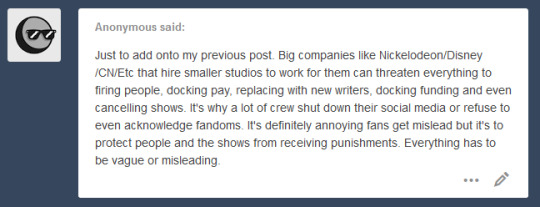
(Anon, I’m really sorry that this is getting dumped on you, but this is an issue I’ve been thinking about for a while, so I kinda went off, oopsss…)
I’m actually fully aware of non-disclosure agreements and the policy behind limiting information that is released to fans, so while I definitely appreciate the sentiment and understand that things are really difficult for the studios and “little guys” on any production team, I absolutely draw the line at buying the idea that fans need to be deliberately misled in order to protect show writers and staff.
There’s a right way and a wrong way to interact with fans and field shipping questions, and the fact that so many shows, book series, and other forms of media exist out there without experiencing the major problems that have affected shows like A:TLA and Voltron is proof that some productions manage fan and media relations very well and others definitely don’t. Aggressive shipping wars and fan behavior bad enough to attract mainstream media attention aren’t the standard experience of most production teams, so when they occur, it is almost always at least in part because of poor management of public relations on the creators’ end.
You won’t see me defending “fans” who cross the line and actually harass or send death threats to each other or any member of a production team, obviously not, but in today’s media environment, it’s a huge trend to make producers and writers out to be victims of their fandoms, whose questions and requests are treated like invasions of privacy and/or infringements on the writers’ creative freedom that must be actively and constantly defended against, a careful balancing act where the staff must constantly avoid ever giving away too much while the rabid fandom accosts them with an unstoppable hoard of demands…
But this is an illusion deliberately fabricated by some production teams to manipulate fan interest.
Media teams act like purposefully misleading audiences is a necessity because fans ask such invasive questions, oh what can we do, they won’t leave us alone about endgame ships! But this is smokescreen that ignores one basic truth: at the end of the day, creators and production teams (should, if well-managed at least) get to choose which questions get answered and which don’t.
Answering questions on social media or in a professional interview? Screen them in advance. Don’t answer questions that require dishonest answers.
Voice actors or writers going out to a convention? Give them strict rules for what they can and can’t hint at. Hell, even answering completely unscreened questions at cons? “I’m sorry, I can’t answer that without spoiling the story” is always a viable response.
A basic “We don’t answer questions about shipping” policy is, in fact, something that production teams also absolutely have the power to choose!
Even as you yourself note, crew members typically have professional social media accounts and can control when and how those accounts get used–they can choose not to respond to fan questions at any time.
Ergo, the choice to offer misleading answers to fans, particularly about relationships, is just that: a deliberate choice.
What’s really going on here is this: Most production teams can’t completely ignore fan questions and still keep fans hyped about their shows. Most creators and teams want and need to interact with and drops hints for their fans to stir up interest, keep people excited during show downtime, or just in general get people talking and speculating about their works. The more strung-along the fans are, the more tension, anticipation, and speculation teams’ provoke, the more active a show’s fandom becomes–and therefore the more a show profits. A quiet, inactive fandom does not attract additional viewership by word-of-mouth, does not move merchandise, and does not prevent loss of viewership over extended waits between seasons.
In short, creators and production teams actively profit from “stirring the pot,” from causing some tension and provoking anticipation/excitement in their fans. By dropping hints and teasers of what’s to come, by answering fan questions that expand on the series’ world or characters, the creators give fans more to talk about–and therefore can anticipate more talking about their show in general.
“Buzz” is money in the bank.
And production teams have discovered that nothing provokes buzz among online fans as quickly and productively as shipping. Targeting relationship-hungry fans (typically female fans, by the way) and stringing them along with hints, teasers, and red herrings about endgame ships is absolutely a profit-producing venture for show writers and teams nowadays. Getting ship-happy fans all excited about potential romances in your show, so much that they’re out there writing online manifestos, creating fanworks for your shows’ characters, talking to all their friends about it? #DOLLARSIGNSSSSS. Creators, both manipulatively and non-maliciously, actively capitalize on networks of online fans, especially fanwork creators like fanfic authors and artists (both of whom often focus on relationship-related material) to generate additional interest in their shows and therefore produce greater revenue in the long-term.
It’s basic logic: tease your fans -> generate more buzz about your show -> attract more attention -> profit.
(I don’t mean to say that creators are only ever thinking about making money, obviously–of course they naturally want to interact with fans because doing so is intrinsically rewarding and fun. Naturally creators are excited and want to interact with their fans! But that doesn’t mean that it isn’t ALSO a very specific, very obvious way to increase the popularity of one’s work.)
So sure, it’s all well and good to say “We can’t tell you the truth because we can’t spoil the show!” but let’s not act like that’s the only reason writers and show staff drop vague and misleading answers on their fans.
Teased fans, anticipatory fans, hopeful fans, hyped-up fans, obsessed fans… These are the “whales” of viewership, the ones who flood your show’s convention panels, buy your show’s merchandise, haunt the media for even the tiniest tidbits of new info on your work… These are the kinds of people who sit down and force everyone they know to watch your show too. They’re exactly the kind of fans you want to court and keep the attention of. And production teams know that they can keep and inflame the attention of these fans, in large part, by hinting at exactly the things those particular fans want to hear–whether or not they ever intend to fulfill on the things they’re hinting at.
By carefully sprinkling out hints–even and often intentionally misleading hints!–creators increase the tension and interest among fans to deliberately capitalize on their energy, investment, and willingness to continually, obsessively talk about the show.
Say it with me guys:
Shipping wars are money-makers.
It’s not just a matter of keeping secrets to protect the little guys. It’s a matter of keeping secrets and misleading fans intentionally to produce more revenue.
Creators don’t have a vested interest in being honest and open with their fans because they actively benefit from secret-keeping and misinformation.
And you know what?
I actually think that’s fine. I can’t even imagine a world in which every writing team came forward and said “Here are spoilers for everything and every relationship in our story, so you guys don’t have to fight over them!” Obviously the entire concept of spoilers exists for a reason–most people don’t WANT to know every twist, turn, and relationship in a story in advance. We LIKE being teased, we like hunting for hints, and we even like being strung-along as we get to experience the anticipation of satisfying plot twists still to come.
No one is asking for a full plot synopsis in advance.
But there IS a right and wrong way to drop hints for fans, and some obviously right and wrong choices to make, especially when creators become aware that their fandoms are becoming aggressive and hostile. Creators absolutely have the power to make bad situations in their fandoms much, much worse, and a blanket “It’s not our fault; we had to be misleading!” is nothing more than a way of passing the buck and pretending like production teams don’t have a major hand in setting the tone for their fandoms overall.
Of course fans are accountable for any of their own bad behavior, but poor public and media relations absolutely have the power to poison fandoms and incite aggression. When you deliberately yell “Fire!” in a theatre, you can’t claim you’re not responsible for the chaos that follows. When you bring up politics at a family dinner, you can’t act like the argument that follows wasn’t your fault.
The intentionally “vague and misleading” things creators say have profound impacts on their fandoms, and therefore creators and production teams have a responsibility to interact with their fans in a professional and mindful manner.
Of course you want to tease and trick a little! But it’s remarkably easy to do so in a non-damaging manner:
Instead of:
“Character A might end up with Character B OR Character C!” (obviously inflammatory)
It would be perfectly reasonable to answer with:
“Character A is going to have a romantic arc by the end, but let’s just enjoy that story line as it comes!” (teases and excites fans without fueling conflict between fan groups)
Instead of:
Character A and Character B are totally compatible! (obvious ship tease)
Say:
We planned for all our characters to be compatible with each other to build interesting dynamics between everyone. (redirects attention toward your story’s overall goal without lowering any shippers’ hopes)
Instead of:
Oh I can’t tell you too much, but I can tell you Character A and Character B are going to have a lot of ~mEaNiNgFuL~ interactions in the future! (obvious bait)
Say:
We’re really excited about where our characters are going in the future, especially [insert company approved spoiler-ish tidbit here]! (gives fans something new and exciting to talk about without leaving them feeling like they’ve been tricked)
Get explicitly asked about a ship by a fan and for some reason absolutely have to give an answer? Saying “We can’t spoil any romances that might or might not happen, but we wrote the story the way we thought was best, so hopefully you’ll enjoy where it goes!” gives shippers hope without making anyone feel like they were promised something that was never going to happen.
And good lord, have you discovered there’s a serious dispute brewing between groups of your fans? Uh… Have you tried not giving answers that deliberately favor one ship in one interview and then conflicting answers that favor the other ship in another interview, leaving your fans confused about your stance? Have you tried uhhh… redirecting fans to your plot or world-building and getting them hyped about things you’re actually planning to include in the show instead of relationships you never intended to make good on? Have you tried uhhh… maybe just NOT dumping fans from the frying pan into the fire by commenting further on ships you already know are causing tension?
There are plenty of ways for production teams to be vague and avoid spoilers without disproportionately raising fan expectations and contributing to conflicts between fan groups. The copious companies who manage popular shows without their fandoms dissolving into public death threats and toxicity so notorious that people who don’t even watch the show know about it are perfect proof. Some creators and production teams are just really, really fucking bad at PR, and that’s a problem! That’s a problem that contributes to serious and sometimes even literally dangerous issues among fans. If you’re in the industry, as you claim, that’s something you should and need to be aware of and take responsibility for.
Like, I’m not in even in PR, but it doesn’t take a degree in communications to figure out that there’s a very obvious line between the type of teasing that’s going to contribute to a productive, positive fan environment and the type of baiting and misleading that’s going to foster divisions and frustrations among your fans.
Of course it’s not always the creators’ or team’s fault when a ship war starts! These things can’t always be predicted and we’re all just human. People slip up and blunder when interacting with others all the time. Mistakes happen. But when the creators actively contribute to a ship war, fan the flames, encourage both sides, and either deliberately or carelessly hype up fan expectations they know they have no intention of fulfilling (as was the case with both A:TLA and Voltron), they’re increasing and encouraging the hostile environment in their fandoms–sometimes very intentionally to reap profits off obsessed fans.
So like, I get it? No one is asking for creators to be less vague or drop all red herrings. No one wants the entire story spoiled in advance.
But as a viewer, I do expect creators and production teams to demonstrate professionalism in their responses to both other media and directly to fans. I expect them to respect their viewers and to tease their fans in a genuine, responsible way that doesn’t promote conflict or make implied promises that will never be kept simply to turn a profit off of hopeful fans.
Most importantly, I expect creators and production teams to be aware of the impacts their words and answers have on fans, and to be accountable for those words and answers. If creators choose to interact with fans, they need to do so in a way that isn’t actively harmful. That should be pretty freaking obvious to everyone involved.
Will PR blunders and social media mistakes happen? Of course, always.
But is kicking a hornets’ nest–say, teasing that ship you know is never going to happen, when you’ve heard through the grapevine your fans are already divided about it–ever really a mistake?
No sell, buddy.
tl;dr: Expecting professionals to handle PR… you know… professionally isn’t outrageous.
#fandom meta#fans and creators#public relations#showrunners#animation industry#fan questions#toxic fandom#fan expectations#Voltron#avatar the last airbender#this isn't rocket science#and it should be obvious I'm not talking about the little guys on production teams here#those people are rarely if ever directly expected to answer fan questions#the three groups likely to answer questions are the writers#executive producers#and voice actors#and of those three#only the voice actors can really be said to be blameless if they accidentally answer questions about the plot or relationships#if your EPs or writers are deliberately misleading fans#in a way that isn't positively contributing to the fandom as a whole#THAT'S A FUCKING PROBLEM BRO#it's not your fandom's fault if the writers or EPs lack PR training#and if members of the production team are contributing to fan conflicts#uh maybe they SHOULD face repercussions for that#just saying#anon had no idea what hornets' nest THEY were kicking#but this issue has been bugging me for a while#because I'm super sick of creators nowadays acting like they had no hand in contributing to the toxicity of their fandoms#when there's a clear fucking pattern of similarities between toxic fandoms#and goddawful PR is numero uno
52 notes
·
View notes
Text
Gaming Is A Creative Expression
One of the greatest attributes of me is that I'm a gamer. As far back as I was pretty much nothing, I frequently invested more energy playing computer games than doing different exercises.
Obviously, that is one of the supporters of my wellbeing not being the place I need it to be, however regardless of a portion of the long haul hinderances gaming has done in my life, it's given a decent arrangement of advantages.
Advantages that are regularly ignored.
Many individuals believe that gaming is an exercise in futility or that it imparts a great deal of despise and cynicism and there is some fact to that.
Lately gaming and as a rule the tech business is accepted to be the area of men, when not all that far off in the past the business was really a feminized industry. This has started a great deal of dangerous men inside the gaming business.
Yet, I trust these are take issues. Issues that can be tended to after some time as the business changes and creates.
Since more individuals are beginning to realize — or in any event I hope — the advantages of computer games and what gamers convey to the crease. A great deal of enormous gamers have bolstered various huge causes as Mat Pat (who runs two Youtube channels titled Game Theory and Film Theory) has raised in his ongoing recordings. Also there is a ton of research done to gaming that has satisfied liberally.
In any case, I'd like to expand that rundown.
Since while gaming has improved specialists, assisted with mental issues, ease torment, and even help in making individuals feel progressively associated, I imagine that gaming can likewise make for better creatives. The specialists like us essayists, painters, software engineers, and that's only the tip of the iceberg.
Here is the reason.
Gaming Is A Creative Expression
Connecting with an amusement is workmanship itself whether you are playing the diversion or latently watching one. All things considered, programming nowadays has developed more into structuring. As innovation has advanced, we never again need 8-bit pixelated illustrations and our creative energy to make sense of what something is. Innovation today has enabled us to make smooth characters and use a lot of structures and symbolism to pass on more profound things.
A genuine case of this in movement is taking a gander at the Dark Souls arrangement. It's a lot of recreations from an organization called FromSoftware which as of late discharged Seikiro that pursues a comparative topic.
However, what's so intriguing about the Dark Souls diversions is the way that the plot of the amusement and the majority of the legend is dispersed all through the world. You suspect that legend and data from the characters that you meet, what they state, what they wear just as the things that you get (in particular the weapons, and protective layer).
Accordingly, meticulousness on the planners part is significant yet additionally the players. It's up to us as players to sort out the legend and think of our own speculations. Also, it's up to the fashioners and other individuals associated with the amusement to give us the apparatuses we can use to do that.
What this implies for creatives is that amusements like Dark Souls enable us to be increasingly expressive. It's searching for those subtleties and making associations. This kind of conduct is like different types of craftsmanship.
Workmanship is communicated through our elucidation. Regardless of whether that is through the words that we use or the image that we paint and show to the world. Gaming is simply one more route for us to all the more likely tap into those innovative minutes.
At the end of the day, gaming can give us feed to us to all the more likely convey what needs be or show different sides of us.
Gaming Is Relaxing
In any case, the excellence of gaming is that you don't have to play any sort of profound legend diversion like Dark Souls. You can run with something progressively fundamental. Take the Binding Of Issac.
It's a straightforward amusement with exceptionally basic legend and essential in structure.
There's not so much anything unfathomably profound behind the legend, however individuals can at present make a lot of hypotheses behind the diversion.
For me, I see this diversion as to a greater extent a loosening up amusement. Despite the fact that the amusement is you actually shooting tears at adversaries and watching them detonate into guts and blood.
It very well may unwind as in you don't should think as much the more experience you've had with the amusement. You're acquainted with the things, plans of the rooms, etc after you've played a decent fifty hours or thereabouts. From that point it's a matter of making a cursory effort.
I'll let it be known's somewhat hard to clarify yet I feel this is the situation with different amusements. The more you become acquainted with the diversion and the internal activities, the more that you latently know and don't have to depend such a great amount on reminding yourself.
You enable yourself to concentrate on different things or simply unwind while you're gaming.
I regularly go through gaming just to siphon myself and make sense of what to expound on straightaway.
Gaming Can Be Therapy
In any case, another part of gaming is that gaming can be restorative as well. Contingent upon the kinds of amusements that one plays, there is a lot of research pointing at the class of diversion enacting certain pieces of the cerebrum.
For the greater part of my life, I've generally been playing procedure based diversions and through that, my mind has built up a ton regarding critical thinking.
I perceive this as at whatever point I converse with myself at whatever point I have issues, I realize how to deal with them and instinctually consider approaches to work around genuine issues. Making a move toward the start of this is an entire other story, however I in any event have a solid methodology of what I can do to settle the different issues around my life.
I consider gaming to be a kind of treatment for myself. A route for me to bring myself back up and disclose to myself that it's alright and things will show signs of improvement.
Also, that is identified with gaming just as we win a few diversions and lose a few. And keeping in mind that a few of us lose our temper, or feel tragic we lost, regardless we keep on pushing forward. Since we realize we'll prevail as long as we have a receptive outlook.
Also, this implies a great deal to essayists and different craftsmen. For the most part since we're regularly alone. What's more, certain we have Facebook gatherings and networks of journalists we can swing to, yet I feel that a few issues are ideal to work out alone. What's more, gaming can give a touch of road to help with that.
Gaming isn't only a recreation thing or an action that benefits more youthful people. It can move new thoughts that illuminate main problems that creatives can convey to the table.
1 note
·
View note
Text
The Ranking of Final Fantasy: Final Fantasy III
Final Fantasy III is the second game that the West didn't see an official localised version until many years later. Initially released a few years after Final Fantasy II in Japan, it was remade with a new localisation and 3D update 26 years later in 2006 on Nintendo DS. This game is important in the lineage of the series as it's the one that set the motifs of the series; Chocobos, Cid as a recurring character, Job specific actions, even some of the designs of iconic jobs that are still used today. But was the game worth the long wait for Western audiences?
The version of the game I played (and will continue to play from here on out) is the version available of Steam, which is itself a version of the mobile port. The only real differences between these versions and the DS remake is the User Interface, which I personally didn't kind too off putting despite looking a bit clunky. The content and graphics are otherwise the same as the DS version. Upfront I'll say that I like the style of the 3D remake. It retains the chibi-esque style for the characters that the series is known for during the NES/ SNES era. The world is colourful and benefits from the 3D modelling by giving the world more character through the use of added details to the floor tiles. The game was no slouch on the NES either though, it definitely improved graphics compared to previous games, with unique sprites for each job that the characters could take and battles looking more impressive than ever. It's honestly quite impressive what Square managed to do with the NES, even if there was a few assets clearly still being used from the original game (mostly world map town and castles looking very similar, and the warrior sprite being literally the same from Final Fantasy I).
Basic gameplay is untouched during the exploration of the world from previous games. You're still walking through dungeons picking up items, fighting random battles, talking to townsfolk to gather clues for how to advance forward. The wrinkle this game provided to the formula is that each character can change their 'job' whenever they want from a growing selection. This means that you're not stuck with the same class set up from the get-go like in the original game and characters more instantly specialise unlike in FF2. Bored of your current set up? Just change that White Mage to a Red Mage, or try an all offensive group of melee brawlers! In the remake the only downside to switching is that there's a 'cooling off' period after switching in which you have to fight a certain amount of battles with lowered stats before becoming normal. Stats don't carry over between jobs either, with the only permanent change being HP, which does lead to an issue where characters who didn't play much as melee characters can end the game with a disadvantageous amount of health (this is definitely something that happened to me). Overall though this is a rather fun system to experiment with, keeping me engaged throughout most of the game's playtime.
Situations that the game throws at you sometimes lead to influencing your party composition. This comes with some mixed results though. The more interesting of these is where you have to go through a dungeon while being mini, meaning that physical attacks are useless. This means that the best way through these dungeons is to bring a party of casters, which definitely mixes things up and is interesting to think and plan around. A situation which isn't as good however is during a part of the game where you're stranded in a town area and the only way to get out is to beat the boss of the area: Garuda. The problem with this part of the game is that if you don't take a party of Dragoons (which the game heavily implies you should do) then you are already dead. Only Dragoon gear is attainable and the boss' weakness is spears but this doesn't make this interesting as there's only one solution to the encounter. A similar issue occurs during a late game dungeon where the only way to get through without pulling your hair out is to bring a party of Dark Knights to stop all the normal enemies you encounter from duplicating themselves. The problem with this is that Dark Knights are basically worthless outside of this dungeon as they don't bring much of interest in terms of their abilities. The 'getting mini or turning to a toad to get in to the dungeon' gimmick also starts to wear thin by the end of the game, mostly because it wastes 2 charges of magic to get the party small or warty and then back again. It's nothing game breaking but it becomes a tired gimmick by the end of the game.
The dungeon design in general is much improved over the last game, however. Gone are the trap rooms that yielded nothing but crushed dreams and a thousand random battles. The dungeons now are a bit more linear with off shoots from the main path that more often than not have some goodies to pick up. None of them are overly complex to the point that you'd get lost and none of them ever really last too long either. Dungeons even have a bit of characteristics with them as they often have unique designs apart from a couple of the optional dungeons which are just generic cave dungeons. Otherwise they're fine, nothing to really complain about or overly praise either to be honest.
Final Fantasy III does not try to tell a story as ambitious as Final Fantasy II's, although it is still more fleshed out than the original game's. In the remake the developers tried to give each of the 4 heroes their own personality and backstory but it's rather thin and doesn't amount to much by the end. It's still more than the nothing you're given in the NES original (although your characters spoke between each other, there was never names attached to lines and they never really said anything profound). Characters in general are rather thin to be honest, there's no character dynamics I found to be memorable and even a lot of the major characters are more plot device than characters. Cid's got a wife in this one though, so that's... nice! What is interesting about the game is the world building that the game does. This isn't any more evident than when you realise that the world map you started on is only a tiny part and is actually just a small floating island in the corner of the map. You get out, and the world is covered in a thick fog that you need to disperse. It's interesting, and the build up to the Crystal Tower at the end is a fun experience as you uncover parts of the world and how the darkness has affected parts of it. The conclusion is rather limp though, with the guy you've been chasing throughout the game not actually being the last boss but actually being manipulated by an even greater threat known as the Cloud of Darkness! Gasp! This is another theme that ends up being carried forward in to the series too. Unfortunately, the Cloud of Darkness and the Crystal Tower, as cool as they are, is where I found issue with the game in general.
Up until the Crystal Tower, the game is not too hard (even with bosses in the remake attacking twice per turn) and seems overall to be well balanced. I beat most bosses on my first or second try and the fights seemed just hard enough that they were lengthy and fun. None of this is an issue until the very end of the game. You climb the Crystal Tower and nothing really poses too much of a threat: usually a good sign that you're in the right level curve to face what's coming. I reached the top, beat Xande rather easily and then Cloud of Darkness shows up and your group follows her to her realm: The World of Darkness. This is a point of no return by the way. Here, there are boss level enemies you fight in random encounters, have to fight 4 bosses with HP pools double that of Xande's, and then fight Cloud of Darkness who has 4 times his health. She has a group-wide attack originating from one of her tentacles that does massive magic damage as well as being able to attack twice herself. It's such a huge difficulty spike and it's completely unfair with it coming after a point of no return, meaning that if you fail you have to go through the whole of the Crystal Tower again, wasting a couple of hours' progress. This is such a sour note to end the game on after it being so enjoyable up until this final dungeon, it's such a shame that the game stumbles so hard on the final hurdle. It doesn't help that the way the story ends involves a contrived event that brings characters from the game with 'pure hearts of light' to help the heroes out of a jam, and for some reason, one of those characters is one of the old men who thought they were the warriors of light. A character that seemed to have been used as a joke in one of the towns. I audibly said to myself 'are you actually serious?' when it happened, it was such a bizarre plot point.
I don't wish to end this review on a sour note, however, as I can more than confidently say that the music in this game is incredible. After the disappointing showing from Final Fantasy II this is a breath of fresh air. The overworld theme has a light airy sound to it that evokes a quiet mystery, the battle themes are exciting and energetic, the boss theme is incredibly iconic. The only tracks that annoyed me were the 'liberated' theme which plays in certain towns and locations after a saving it from a major threat, and a couple of the town themes were pretty obnoxious to the point where I just wanted to get out of them as soon as I could. As it's a NES game the themes are pretty short loops, which does lessen the impact of the good songs and amplify the irritation of the lesser ones. Overall though, a big thumbs up in the music department!
To conclude then I enjoyed FF3 quite a lot overall, to the point where I stayed up late a lot to play it. I would say I enjoyed it more that the previous 2 games even though this game has flaws all of its own. The job system is great and fun but is ultimately a bit shallow, especially when comparing to games to follow (hint, hint). I would still say this is the best of the NES era games though due to it having ambition and mostly hitting the right notes, unlike Final Fantasy II. The series' biggest flaw at this point of it's life is that the plot and characters are still rather underdeveloped but they've given the games their own distinct style and gameplay that is well refined. The old games would probably be best kept to only being played by die-hard fans, even the remakes.
Current Rankings:
Final Fantasy III
Final Fantasy I
Final Fantasy II
12 notes
·
View notes
Text
*Kanye’s Narrative*

Photo source: https://variety.com/2016/music/news/kanye-west-grammys-rant-twitter-1201713892/
Palczewski claims that “Narratives have great power to create understanding and knowledge,” but only when that power is articulated correctly. I will be examining the questions: What narratives does this artifact tell? What truths does it promote, limit, or ignore? Overall, is this narrative positive or negative for society?
In order to properly interrogate these questions, I will be using one of Kanye West’s public speeches/rants on Twitter. Feeling major negative feedback from recent public events, Kanye West’s narrative to his Twitter followers includes telling his audience to be whomever they want, he paints a picture of media being robotic propaganda, but is overall a positive narrative to introduce to society.
Prior to Kanye West posting this video of himself on Twitter, West had been dealing with mental illness in previous months to this narrative. However, he felt that his diagnosis was wrong. Shortly after, Kanye was featured on SNL and received negative feedback because of his support for Trump. This speech that West gives seems like an attempt to get his power back from media.In the video, West uses rhetoric to try to get his audience to not only understand how feels, but to emphasize that he is allowed to feel that way. West approaches this several different ways.
While narratives are not referential, they are based off of one’s telling of events. Kanye attempts to tell multiple narratives that are regarded are rhetoric because of the bias or perspectives he tells of the event. One of the first truths that Kanye’s narrative attempts to declare is the truth that the media is controlling our minds. In fact, Kanye not states that the media controls his mind and made him out to be someone he was not. He begins his narrative with examples of wrongness in the news media,stating that the media was wrong about the 2016 election. He then moves to apply those events to his specific instance. For example, one of the lines of his speech says that media posts “to make me look like I’m crazy to you. I am not crazy” (as cited in Meara, 2018). In this specific instance, West uses narrative to show his followers that he is not “crazy” no matter what any doctor, person, or media says. He uses examples of media being wrong to further prove they are wrong about him. West’s logic is that the media may say false things about you, but we have to look past that and just love. This brings us into another truth told through West’s narrative: we should love ourselves for who we are. This could also be seen as the end point to Kanye’s narrative about the media. Kanye West emphasizes the importance of ignoring what others say so we can be ourselves. In an attempt to emotionally engage his audience, he makes arguments using deeply touching phrases and sayings such as “the beauty you have is inside you. It’s not based on how many records you sell” (as cited in Meara, 2018). Every audience loves a good story about the protagonist who overcomes his rival’s opinions of him, and that is exactly what Kanye West gave them. He attempts to pull at their heart-strings by using deeply profound sayings.
One of the most crucial aspects to Kanye’s narrative being successful rhetoric is his persistence that the media that consumes our lives in the United States. In fact, West actually begins his taped speech with the words “I just want to talk about mind control” (Meara 2018). He then goes on to use the phrases “mind control” and “programmed robot” repeatedly throughout his video. West’s narrative is that the media has control of our mind and everyday lives. Palczewski also discusses this narrative of the media when they state “Newspapers, news shows, Internet sites are filled with narratives about the issues and personalities of the day,” referring to celebrities on the latter. The news media forms their own narrative of Kanye and his life, and the rest of the world is influenced by those news sites. Kanye is trying to go against this narrative. He uses these heavily connotative words regularly because they will stick in the minds of his audience. Mind control is scary to the average person, while programmed robots are sought to be the opposite of human autonomy. West also does this through saying things such as the media is “trying to control you based off of incentivising you” through determining status through how many ‘likes’ or ‘followers’ one has. Along with the implication of control, West also claims that people (he never specificies who) attempt to destroy creativity on a regular occurance. According to Kanye’s narrative, people try to hold him back from “posting something that is like positive on Instagram,” because they want him,“to not express [him]self” (Meara 2018). This also supports Kanye’s claim about the media’s narrative of him. Even when he tries to show “our heart and our spirit,” Kanye’s posts can be removed by any social media platform if it does not go with the “big agenda” (Meara 2018). Kanye’s narrative tells of a controlling, news-dominated United States that steps on one’s creativity. Through the narration of these events, his goal is for his audience to see the broader perspective of social media, and try to direct his audience’s attention to the control social/news media has over the United States. Kanye’s narrative is an attempt to open people’s eyes to the control and agenda the media (in any form ) has over most of the population. When assessing whether West’s narrative is a positive or negative narrative for society, there are many factors that come into play. As quoted in the first sentence of this analysis, narratives have the potential to have a big impact on society. According to Palczeski, “narratives can and should be judged on several levels: aesthetics, authorial intent, empirical truth, and social truth” (129). Kanye lacks aesthetic in his narrative, mainly because he is sharing experiences that are related rather than telling a specific story that has characters and a plot. Authorial truth evaluates “whether the rhetoric intends to make factual claims” (Palczewski). This is a hard judgement to make, especially because it revolves around something that is so large and institutionalized in America (social media platforms). However, Kanye’s narrative seems to be mostly events, reactions, and opinions. But when speaking about empirical truth, all of the events in Kanye’s narrative “reports the events as accurately as possible” (Palczewski). The last judgement to consider is social truth. Whether or not this is an objective reality and that society has all come to this moment/event/realization together. This is the driving force behind Kanye’s narrative. He wants people to see how media has progressed so negatively in our lives. Evidence leads that Kanye West’s narrative does not harm or hurt society in any way, but he does try to help society positively realize this. Kanye’s words are not full of hate or lies, but instead he gives his followers insight that could lead to a more positive future.
One of the biggest disadvantages of analyzing narratives is knowing what is actually the truth. Many people cannot even define what is true, so how are we supposed to know what is and isn’t truthful? This is one question that will prevent any ‘real’ truth from being known. We have to base that truth off of evidence like documentation or fossils in a sense. On the other hand, the advantage of assessing West’s narrative in this manner is that it allows us to see the direct viewpoint of Kanye. Essentially, we see his reactions and hear his thoughts and feelings. This is an opportunity that the media often takes away from him. It is easier to have a deep understanding of a problem when an audience hears two perspectives. In the United States, we are constantly hearing about Kanye West’s life. But did we ever stop to consider that the instances we hear about are only one side of the story? This is why analyzing rhetoric as narratives helps fill the gaps of truth that the media intentionally left out.
John Rodden can also speak to the advantages of narratives. Rodden states that instead of the physically provable pieces of evidence we normally see, we see a “more full-bodied and even impassioned” story that is “rational, but also emotive and ethical” (2008). Rodden brings to the table a very feasible argument. As (normal functioning) humans, we can all use our senses to help us see, hear, smell, feel, or taste things so that there is tangible evidence. But what evidence fails to consider is the other half of humanity. That other half is filled with emotions and mental feelings and reactions. Since every person (again, assumably normal) experiences emotions daily, it should not be used as a disadvantage to rhetoric as narratives.
Narratives play a powerful role when studying rhetoricism. Presumably, any credible narrative contains empirical and social truths that are told through the narrator’s perspective on those events. Since it is a personal recalling of the events/experience, it is easy to introduce bias into the story subconsciously, so we typically discount narratives. However, narratives are crucial to getting the full scope of things. When negative feedback came back to Kanye more than once, he decided to tell his narrative. Kanye West’s narrative to his Twitter followers includes painting the picture of media as robotic propaganda, and embracing themselves for whoever they may be. Overall, this is a positive narrative that would have positive effects on society.
References:
Meara, P. (2018, October 14). Kanye West Goes On Another Rant To Declare He's Not Crazy. Retrieved from https://www.bet.com/music/2018/10/13/kanye-west-rant.html
Palczewski, C. H., Ice, R., Fritch, J. (2012). Narratives. In Rhetoric in civic life (pp. 117-146). State College, PA: Strata Publishing, Inc.
Rodden, J. (2008). How Do Stories Convince Us? Notes Towards a Rhetoric of Narrative. College Literature, 35(1), 148–173. Retrieved from http://fulla.augustana.edu:2056/login.aspx?direct=true&db=a9h&AN=28047161&site=ehost-live
1 note
·
View note
Link
Excerpts regarding “High Life”, highlighted parts about Rob, meeting with André Benjamin (another cast of High Life), opps a little spoiler of High Life, BTS of shooting High Life in Cologne, quotes from the producer Andrew Lauren, words from Olivier Assayas about Claire Denis, and words from Des Hamilton :
“High Life,” which cost millions more to make than any of Denis’s previous films, seems, on its surface, dramatically divergent from the rest of her body of work, yet versions of its premise swirled inside Denis’s mind for more than a decade. For years, she had wanted to tell the story of the last person in the world. In the film, the galactic convicts perish one by one. Only a single felon survives, along with his daughter, who was born on the spaceship. (Olafur Eliasson, the Danish-Icelandic conceptual artist who a decade ago erected waterfalls in the East River, designed the spaceship for the movie.) Their relationship—literally forged in a vacuum, with a whiff of the taboo—was her primary interest in the story. “It’s feminine and masculine,” Denis said. “It’s family blood but it’s not the same sex.”
The script, which Denis wrote with her longtime screenwriter, Jean-Pol Fargeau, took years to complete. (Zadie Smith and Nick Laird worked on a draft that Denis ultimately rejected.) Though Denis treats scripts as provisional and merely suggestive documents, hers are full of vivid sensory detail. When “High Life” ’s main character, played by Robert Pattinson, is introduced, he is “pressed against the exterior of the spaceship, like a mountain climber against a sheer cliff face.” Later, when he changes out of his spacesuit, he does so “like a knight removing armor.”
Denis saw Pattinson in “Twilight,” she said, and was struck by his “heartrending charisma.” She had wanted someone older for “High Life”—she thought at one point of Philip Seymour Hoffman—but after meeting with Pattinson in Los Angeles and Paris she realized that “he was already in the film.” She went on, “When he said to me, ‘Are you sure?’ I said, ‘It’s already too late. It’s you or nobody else.’ ” She chose “High Life” ’s other stars, including Juliette Binoche and the English model and actress Mia Goth, with similarly instinctual possessiveness. In the summer of 2015, Denis and her producer, Oliver Dungey, flew to Atlanta to meet André Benjamin, the rapper, actor, producer, adroit hat-wearer, and all-around cultural icon, better known by his stage name, André 3000, and for his flamboyant role in the Atlanta hip-hop duo OutKast. Denis had enjoyed Benjamin’s lead performance in “All Is by My Side,” a 2014 biopic of Jimi Hendrix, and she had got it in her mind that he should play a part in “High Life.”
The three had agreed to meet at the St. Regis Hotel’s restaurant for lunch. “Here we are,” Dungey recalled, “me—this sort of posh, square English guy—and Claire—this scorny French lady—and in walks André.” Benjamin said, “I’ll be honest with you. I don’t know who you are or what you want, but everyone is telling me I have to meet with you and I’ve got to do this film.”
“They immediately hit it off,” Dungey said. “I’m just sitting there, picking at grits. The purpose of the trip was accomplished within thirty seconds.”
The only other people in the restaurant were two Gambian ladies visiting from, of all places, the Cotswolds. “Why were they there?” Dungey said. “I don’t know. But, then again, why were we there?
“Claire and André were talking about eating snake,” he continued. He shrugged in a manner that suggested his exclusion from the conversation had been so profound as to be painless. “Claire was saying how it gives you this vitality, this life force. And one of these women from Gambia turns around and says, ‘She’s right!’ ”
Moments later, a statuesque woman arrived. “She waltzes in and apparently knows André,” Dungey said. “She hugs him, asks how he’s been, blah, blah, blah. This woman looks fantastic: she has ribbons in her hair, lots of beads, she’s colorfully dressed. André introduces her to us as Dana.” Here Dungey paused, smiled, and shook his head. “This is not Dana. This is Queen Latifah.
“Claire is obviously taken with this woman while having no idea who she is. She just kept telling her she looked like a queen,” he continued. (Denis insists that she was well aware of Dana’s identity.) “The ladies from Gambia know who she is, though, and they also know who André is, and they ask for a photo. Queen Latifah ended up paying for all our lunches without saying anything.”
Dungey added, “It was really one of the most charming and weird moments of my entire life.”
........
Similarly, in “High Life,” some of the convicts are black, but they are not a message-telegraphing majority. When the film’s American producers read the script, they urged Denis to change the fact that the first character to die was a black man. In the U.S. today, they told her, this was just not done. For Americans, Denis said, the problem of racism “is buried so deep. For me, it was not deep.” She refused to change the plot, writing in more dialogue instead. In the final version, André Benjamin’s character says, “See? Even in outer space, the black ones are the first to die.”
.......
With “High Life,” Denis will inevitably receive more international attention than she ever has, but for years many filmmakers have spoken of her as a sort of secret saint
........
“It’s such a macho, minimalist film,” said Andrew Lauren, one of the producers of “High Life” and its financier, who saw “Beau Travail” years ago, on the recommendation of his father, the designer Ralph Lauren. “When this new project came to us, and I went back through Denis’s filmography, I was, like, ‘Wait, she did “Beau Travail”?’ I would have sworn that a man made it. She’s like the precursor to Kathryn Bigelow.”
........
Unlike Denis’s past movies, which were shot on location, mostly in France and Africa, “High Life” was largely filmed at a studio in Cologne, during two months last fall. The cast and Denis stayed at a hotel thirty minutes away. The drive, made each morning and night—often with a P.A. behind the wheel who was described to me as “the worst driver in the history of mankind”—took them past oil refineries, sausage factories, and tractor-trailer bordellos that were parked, with German efficiency, along the highway exits.
By all reports, it was a trying experience. Denis was unused to filming in a studio. She made scene changes constantly and with little warning, sometimes by text message. Benjamin described an atmosphere of inadvertent method acting. “These convicts are all supposed to be from different places—they don’t know one another at first, and they’re just trying to make it,” he said. “And, on set, it was the same! I’m this guy from Atlanta, Claire’s French, obviously, most of the guys on set are German, the actors didn’t know each other. It was a trip.” Robert Pattinson, who, several people said, spent much of his time on set asking existential questions—Wait, who am I in this movie? What are we making here?—told me, “It’s a very abstract way of working. It feels like experimental theatre, frankly.”
Lauren said, “A lot of people were thinking, This is good for my résumé, but I wish I weren’t here.” He continued, “I think, if you make a movie with Claire, you can make any movie.” He compared the process to over-preparing for the SATs, or training at high altitudes, so that your performance at sea level feels easier on game day. At an early color-test screening, held at an ornate theatre in Cologne, Denis’s voice was the only one in the room, saying, “Merde! Crap! What are we doing? Why am I here?” Lauren said he thought “everyone sort of took it personally.”
At the end of each day, the cast and crew convened at the hotel bar. “Everyone would sort of be sitting at different parts of the bar, and she’d walk in and it was, like, Shit! Claire’s here!” Lauren recalled. “I saw a lot of people wanting to leave many, many times, but they stayed. They stay because they love her—even though they can’t stand her.”
Denis does not deny such behavior. “I can be the worst person, the meanest person on a set,” she said. “Shouting, screaming, complaining. I don’t have a lot of respect for myself as a director. People accept me the way I am, because they know I’m not faking. Probably.”
When I described these accounts to the filmmaker Olivier Assayas, a close friend of Denis’s, he laughed. “There’s a certain form of chaos in the way she works,” he said. “When you make movies, it’s always disturbing how confident everyone involved is that they know how things should be done. And you have to constantly remind them, No, you don’t know how it’s done, I don’t know how it’s done, nobody knows how it’s done. You create chaos as a way of destabilizing the surroundings that could bring you to make something that would otherwise be conventional.”
.....
Hamilton (casting director)recalled witnessing the initial meeting between Denis and Pattinson, in Los Angeles, and feeling like “these are two people on a date, and I really shouldn’t be here, maybe I should actually remove myself?” With obvious pride, Denis recounted how Pattinson took the train from London to visit her in Paris. “He came to me like a friend,” she told me. “You know, in London, Robert has to hide because of girls?” (A representative for Pattinson said, “He doesn’t hide from anyone.”)
Full Article
32 notes
·
View notes